Edie Melson's Blog, page 360
November 13, 2015
7 Punctuation Pitfalls for Writers to Avoid
by Vonda Skelton @VondaSkelton
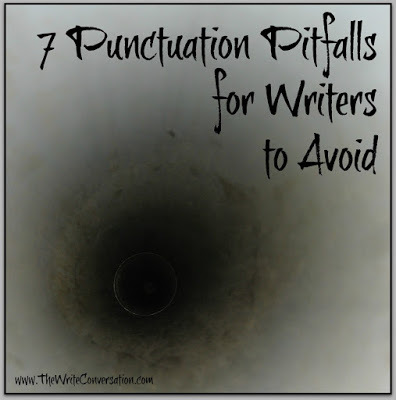 First of all, here's my disclaimer: I am NOT an expert in English. I don't have a degree in English and wouldn't dream of trying to tell you how to create perfectly-punctuated pieces.
First of all, here's my disclaimer: I am NOT an expert in English. I don't have a degree in English and wouldn't dream of trying to tell you how to create perfectly-punctuated pieces.
That said, I do a fair amount of critiquing and do feel fairly confident in offering some general hints to finding the most frequent errors I see. And yes, I've seen variations of each of these examples in manuscripts I’ve critiqued.
These 7 punctuation pitfalls could mean the difference between an acceptance and a rejection in your writing life.1. When writing dialogue, place quotation marks around the spoken words, not the speaker tag.Correct: "You didn't tell me that," Tom said.Incorrect: "You didn't tell me that, Tom said."
2. Do not use semicolons or colons to denote dialogue in prose.Incorrect: Sally said: "I want you to go with me."
3. Start a new paragraph with each speaker, including any action or thoughts that speaker may have.Correct: "I will if you will." Sarah stared across the table at her little sister.
Carrie met her gaze. "I'm in."
 4. Be sure to include the dash, question mark, and exclamation mark within the quotation marks when they are part of the quoted material. Put them outside the quotation marks when they are part of the whole sentence.Correct: "Why do you say that? It wasn't me!" Jerry said.Incorrect: "Why do you say that? It wasn't me"! Jerry said.Correct: How can you call them "half-truths"?Incorrect: How can you call them "half-truths?"
4. Be sure to include the dash, question mark, and exclamation mark within the quotation marks when they are part of the quoted material. Put them outside the quotation marks when they are part of the whole sentence.Correct: "Why do you say that? It wasn't me!" Jerry said.Incorrect: "Why do you say that? It wasn't me"! Jerry said.Correct: How can you call them "half-truths"?Incorrect: How can you call them "half-truths?"
5. Do not use a question mark with an indirect question.Correct: He didn't ask how anyone could know that.Incorrect: He didn't ask how anyone could know that?
6. Use an ellipsis (three spaced periods) to denote omitted words in a quote, to designate a pause, or to show an unfinished statement.Correct: I pledge allegiance . . . with liberty and justice for all.Correct: "But I didn't know you were so . . . so . . . "
7. Use an em dash (two dashes) to indicate an interruption in dialogue, a break in thought or sentence structure, or a parenthetical explanation.Correct: "But you never said--"
"I never said what? Tell me!"Correct: Who would have thought--who could have thought--it would ever come to this?Correct: There were only three careers--doctor, lawyer, and Indian chief--that I would even consider.
Okay, so there they are, seven punctuation pitfalls you’ll want to avoid. Develop a keen eye and ear for such mistakes and you'll increase your chances of publication!
What mistakes bug you? Share your pet peeves below in the comments.
Don’t forget to join the conversation!Blessings,
Vonda
TWEETABLES7 Punctuation Pitfalls for Writers to Avoid - @VondaSkelton on @EdieMelson (Click to Tweet)
Learn the basics of punctuating dialogue - @VondaSkelton on @EdieMelson (Click to Tweet)
 Vonda Skelton is a speaker and the author of four books: Seeing Through the Lies: Unmasking the Myths Women Believe and the 3-book Bitsy Burroughs mysteries for children 8-12 yo. She’s the founder and co-director of Christian Communicators Conference, offering speakers’ training and community for Christian women called to ministry. Vonda is a frequent instructor at writer’s conferences and keynotes at business, women’s, and associational events. You can find out more about Vonda, as well as writing opportunities and instruction at her writer’s blog, The Christian Writer’s Den at VondaSkelton.com.
Vonda Skelton is a speaker and the author of four books: Seeing Through the Lies: Unmasking the Myths Women Believe and the 3-book Bitsy Burroughs mysteries for children 8-12 yo. She’s the founder and co-director of Christian Communicators Conference, offering speakers’ training and community for Christian women called to ministry. Vonda is a frequent instructor at writer’s conferences and keynotes at business, women’s, and associational events. You can find out more about Vonda, as well as writing opportunities and instruction at her writer’s blog, The Christian Writer’s Den at VondaSkelton.com.
 First of all, here's my disclaimer: I am NOT an expert in English. I don't have a degree in English and wouldn't dream of trying to tell you how to create perfectly-punctuated pieces.
First of all, here's my disclaimer: I am NOT an expert in English. I don't have a degree in English and wouldn't dream of trying to tell you how to create perfectly-punctuated pieces. That said, I do a fair amount of critiquing and do feel fairly confident in offering some general hints to finding the most frequent errors I see. And yes, I've seen variations of each of these examples in manuscripts I’ve critiqued.
These 7 punctuation pitfalls could mean the difference between an acceptance and a rejection in your writing life.1. When writing dialogue, place quotation marks around the spoken words, not the speaker tag.Correct: "You didn't tell me that," Tom said.Incorrect: "You didn't tell me that, Tom said."
2. Do not use semicolons or colons to denote dialogue in prose.Incorrect: Sally said: "I want you to go with me."
3. Start a new paragraph with each speaker, including any action or thoughts that speaker may have.Correct: "I will if you will." Sarah stared across the table at her little sister.
Carrie met her gaze. "I'm in."
 4. Be sure to include the dash, question mark, and exclamation mark within the quotation marks when they are part of the quoted material. Put them outside the quotation marks when they are part of the whole sentence.Correct: "Why do you say that? It wasn't me!" Jerry said.Incorrect: "Why do you say that? It wasn't me"! Jerry said.Correct: How can you call them "half-truths"?Incorrect: How can you call them "half-truths?"
4. Be sure to include the dash, question mark, and exclamation mark within the quotation marks when they are part of the quoted material. Put them outside the quotation marks when they are part of the whole sentence.Correct: "Why do you say that? It wasn't me!" Jerry said.Incorrect: "Why do you say that? It wasn't me"! Jerry said.Correct: How can you call them "half-truths"?Incorrect: How can you call them "half-truths?"5. Do not use a question mark with an indirect question.Correct: He didn't ask how anyone could know that.Incorrect: He didn't ask how anyone could know that?
6. Use an ellipsis (three spaced periods) to denote omitted words in a quote, to designate a pause, or to show an unfinished statement.Correct: I pledge allegiance . . . with liberty and justice for all.Correct: "But I didn't know you were so . . . so . . . "
7. Use an em dash (two dashes) to indicate an interruption in dialogue, a break in thought or sentence structure, or a parenthetical explanation.Correct: "But you never said--"
"I never said what? Tell me!"Correct: Who would have thought--who could have thought--it would ever come to this?Correct: There were only three careers--doctor, lawyer, and Indian chief--that I would even consider.
Okay, so there they are, seven punctuation pitfalls you’ll want to avoid. Develop a keen eye and ear for such mistakes and you'll increase your chances of publication!
What mistakes bug you? Share your pet peeves below in the comments.
Don’t forget to join the conversation!Blessings,
Vonda
TWEETABLES7 Punctuation Pitfalls for Writers to Avoid - @VondaSkelton on @EdieMelson (Click to Tweet)
Learn the basics of punctuating dialogue - @VondaSkelton on @EdieMelson (Click to Tweet)
 Vonda Skelton is a speaker and the author of four books: Seeing Through the Lies: Unmasking the Myths Women Believe and the 3-book Bitsy Burroughs mysteries for children 8-12 yo. She’s the founder and co-director of Christian Communicators Conference, offering speakers’ training and community for Christian women called to ministry. Vonda is a frequent instructor at writer’s conferences and keynotes at business, women’s, and associational events. You can find out more about Vonda, as well as writing opportunities and instruction at her writer’s blog, The Christian Writer’s Den at VondaSkelton.com.
Vonda Skelton is a speaker and the author of four books: Seeing Through the Lies: Unmasking the Myths Women Believe and the 3-book Bitsy Burroughs mysteries for children 8-12 yo. She’s the founder and co-director of Christian Communicators Conference, offering speakers’ training and community for Christian women called to ministry. Vonda is a frequent instructor at writer’s conferences and keynotes at business, women’s, and associational events. You can find out more about Vonda, as well as writing opportunities and instruction at her writer’s blog, The Christian Writer’s Den at VondaSkelton.com.
Published on November 13, 2015 01:00
November 12, 2015
The Writer’s Most Important Tool
by Warren Adler @WarrenAdler
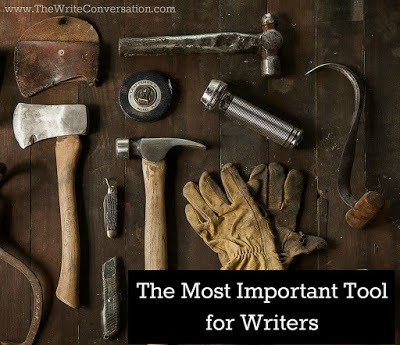 I have written numerous essays on the three repetitive questions asked to and reported by every author I know. For review they are:When do you write, meaning time of day or night?How do you write, meaning pen, pencil, typewriter or computer?Where do you get your ideas?
I have written numerous essays on the three repetitive questions asked to and reported by every author I know. For review they are:When do you write, meaning time of day or night?How do you write, meaning pen, pencil, typewriter or computer?Where do you get your ideas?
The second question in particular about the tool a writer uses to make tangible the inspiration of one’s muse has very consequential importance. A writer is essentially a craftsman who uses the raw material of words to create a product. To do this of course requires a tool.
My first tool, after childhood crayons, was pencils with erasers. Then came pen and ink. Remember pen points and inkwells? Every school desk was equipped with an inkwell in the days when an essential course was “penmanship.” My first effort at writing stories in my school days began seriously with pen and ink. Indeed, my first attempt at a long form story was with pen and ink, a blotchy mess on lined paper in a black notebook with a speckled cover. Even then I was a prodigious rewriter and my earliest teen efforts were barely legible even to me. Besides, my penmanship was lousy and cursive handwriting was not my strongest suit. At age sixteen, I saved to buy a clunky second hand Remington typewriter and taught myself to type. I used it all through college to write my papers and my first serious stories published in my late teens and twenties. I remember having a very good and personal relationship with that clunky Remington. I said goodbye to it when I was drafted into the Army during the Korean War and left my parent’s home. The fact that I was an accomplished touch typist put me in good stead after graduation from NYU as an English major. After a stint as a copy boy at the New York Daily News I became a reporter, then editor, then editor-in-chief of The Queens Post,the largest weekly newspaper in Long Island. Typing speed was necessary to put out a 56-page weekly, write numerous news and features, a column, obituaries, social notes and assorted copy, to keep pace with the demands of publication. There were only two of us and some freelancers. The effort was gargantuan. We had to compose and write like lightning to get that paper out, especially around Christmas time when the paper bulked to 96 pages. In the Army I was assigned after infantry basic training to the Pentagon as the sole Washington correspondent for Armed Forces Press Service where I wrote stories of interest to all services and those of our allies on par with all the major news outlets covering the Pentagon. It was the early fifties and I continued to use a mechanical typewriter although I believe that the electric IBM was beginning to be the tool of choice for most typists.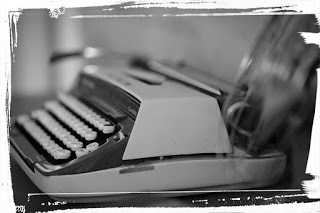 I think I resisted the opportunity to go electric because I feared that somehow the use of a strange alien tool might slow down the creative juices. I continued in my spare time in the Pentagon to write fiction, but, alas, although I tried, my efforts met with rejection after rejection. Not that I had lost confidence in my ability or my talent but I felt that I lacked the marketing skills to get my work published. After the Army, a series of jobs, and then the founding of my own PR and Advertising Firm in Washington I finally went electric. By then I had acquired a wife and three children and my mission was to provide for them as best I could. I had done well in my business career, another fact that I attribute to my writing skills and the expert use of my writing tool. I could write advertising copy, press releases, captions, features, in fact, anything that required useful and creative composing. Throughout this period I never gave up my dream of being a full time novelist. Hell, the stories were piling up in my brain and my hope was that one day my career would morph into authordom. It did come to pass, but only in my middle forties. I set up my writing studio in the basement of my then suburban split level and pounded away all throughout my business career, writing early in the morning, then going off to work. By then, my principal fear was that a breakdown of my electric typewriter would force me to put it in the shop and deprive me of my writing tool for who knew how long. To solve this problem, especially after my first novel was finally published by Putnam who was pushing me to write more novels, I bought two other Smith Coronas, the reasoning being that if one broke down, I would always have at least one spare when the others were in the shop. I can’t remember how many novels I wrote on those three electric typewriters, but I did discover that the advanced tool made little or no difference in the creative flow of my work, a relief. Then came the computer. Again I resisted, fearing yet another technology might interfere with my work. Many of my writing friends were still working on typewriters, some even continued on manuals. I had by then eschewed all business interests and devoted my full time to my writing.
I think I resisted the opportunity to go electric because I feared that somehow the use of a strange alien tool might slow down the creative juices. I continued in my spare time in the Pentagon to write fiction, but, alas, although I tried, my efforts met with rejection after rejection. Not that I had lost confidence in my ability or my talent but I felt that I lacked the marketing skills to get my work published. After the Army, a series of jobs, and then the founding of my own PR and Advertising Firm in Washington I finally went electric. By then I had acquired a wife and three children and my mission was to provide for them as best I could. I had done well in my business career, another fact that I attribute to my writing skills and the expert use of my writing tool. I could write advertising copy, press releases, captions, features, in fact, anything that required useful and creative composing. Throughout this period I never gave up my dream of being a full time novelist. Hell, the stories were piling up in my brain and my hope was that one day my career would morph into authordom. It did come to pass, but only in my middle forties. I set up my writing studio in the basement of my then suburban split level and pounded away all throughout my business career, writing early in the morning, then going off to work. By then, my principal fear was that a breakdown of my electric typewriter would force me to put it in the shop and deprive me of my writing tool for who knew how long. To solve this problem, especially after my first novel was finally published by Putnam who was pushing me to write more novels, I bought two other Smith Coronas, the reasoning being that if one broke down, I would always have at least one spare when the others were in the shop. I can’t remember how many novels I wrote on those three electric typewriters, but I did discover that the advanced tool made little or no difference in the creative flow of my work, a relief. Then came the computer. Again I resisted, fearing yet another technology might interfere with my work. Many of my writing friends were still working on typewriters, some even continued on manuals. I had by then eschewed all business interests and devoted my full time to my writing.
 Writing novels by both manual and electric typewriters was a tremendously time consuming and expensive process. As I stated I am an inveterate and habitual rewriter. My drafts in those days were always full of corrections and had to be typed and retyped ad infinitum. I kept a series of freelance secretaries busy cleaning up my manuscripts for submission. A friend who was a pioneer techie had been on computers for a number of years and after much prodding persuaded me to go digital. I was really scared. The computer was a totally foreign tool and after much soul searching I finally took the plunge. The program I used was Wordstar, long gone. My printer could spit out no more than four pages a minute. Nevertheless, I persevered, largely on the common sensical fact that I would be able to make my corrections immediately and not need endless retyping by a secretary. I missed the sound of my fingertips slapping the keys of the keyboard. I missed the smell of the ink ribbon and the paper. What I learned from the use of these different devices that it made no difference. In fact, I think the computer actually allowed the creative juices to flow more freely. On all these devices, all these tools, I have written more than 55 novels, hundreds of short stories, a number of plays and a never-ending gaggle of so-called blogs like this one. The fingers still dash over the keys and, in a fit of nostalgia, I did purchase a keyboard that replicates the sound of my first old clunky Remington. Perhaps I have over answered that second question. But then, considering the importance of this tool to a full-time writer, I think it deserves such detailed treatment.
Writing novels by both manual and electric typewriters was a tremendously time consuming and expensive process. As I stated I am an inveterate and habitual rewriter. My drafts in those days were always full of corrections and had to be typed and retyped ad infinitum. I kept a series of freelance secretaries busy cleaning up my manuscripts for submission. A friend who was a pioneer techie had been on computers for a number of years and after much prodding persuaded me to go digital. I was really scared. The computer was a totally foreign tool and after much soul searching I finally took the plunge. The program I used was Wordstar, long gone. My printer could spit out no more than four pages a minute. Nevertheless, I persevered, largely on the common sensical fact that I would be able to make my corrections immediately and not need endless retyping by a secretary. I missed the sound of my fingertips slapping the keys of the keyboard. I missed the smell of the ink ribbon and the paper. What I learned from the use of these different devices that it made no difference. In fact, I think the computer actually allowed the creative juices to flow more freely. On all these devices, all these tools, I have written more than 55 novels, hundreds of short stories, a number of plays and a never-ending gaggle of so-called blogs like this one. The fingers still dash over the keys and, in a fit of nostalgia, I did purchase a keyboard that replicates the sound of my first old clunky Remington. Perhaps I have over answered that second question. But then, considering the importance of this tool to a full-time writer, I think it deserves such detailed treatment.
TWEETABLE
The Writer's Most Important Tool - from novelist @WarrenAdler on @EdieMelson (Click to Tweet) Warren Adler's forthcoming novel, Torture Man, is slated to be released on December 1st and can be pre-ordered here.
Warren Adler's forthcoming novel, Torture Man, is slated to be released on December 1st and can be pre-ordered here.
Warren Adler has just launched Writers of the World, an online community for writers to share their stories about why they began writing and invites all writers to share their reflections here. Explore more at www.warrenadler.com.
 I have written numerous essays on the three repetitive questions asked to and reported by every author I know. For review they are:When do you write, meaning time of day or night?How do you write, meaning pen, pencil, typewriter or computer?Where do you get your ideas?
I have written numerous essays on the three repetitive questions asked to and reported by every author I know. For review they are:When do you write, meaning time of day or night?How do you write, meaning pen, pencil, typewriter or computer?Where do you get your ideas?The second question in particular about the tool a writer uses to make tangible the inspiration of one’s muse has very consequential importance. A writer is essentially a craftsman who uses the raw material of words to create a product. To do this of course requires a tool.
My first tool, after childhood crayons, was pencils with erasers. Then came pen and ink. Remember pen points and inkwells? Every school desk was equipped with an inkwell in the days when an essential course was “penmanship.” My first effort at writing stories in my school days began seriously with pen and ink. Indeed, my first attempt at a long form story was with pen and ink, a blotchy mess on lined paper in a black notebook with a speckled cover. Even then I was a prodigious rewriter and my earliest teen efforts were barely legible even to me. Besides, my penmanship was lousy and cursive handwriting was not my strongest suit. At age sixteen, I saved to buy a clunky second hand Remington typewriter and taught myself to type. I used it all through college to write my papers and my first serious stories published in my late teens and twenties. I remember having a very good and personal relationship with that clunky Remington. I said goodbye to it when I was drafted into the Army during the Korean War and left my parent’s home. The fact that I was an accomplished touch typist put me in good stead after graduation from NYU as an English major. After a stint as a copy boy at the New York Daily News I became a reporter, then editor, then editor-in-chief of The Queens Post,the largest weekly newspaper in Long Island. Typing speed was necessary to put out a 56-page weekly, write numerous news and features, a column, obituaries, social notes and assorted copy, to keep pace with the demands of publication. There were only two of us and some freelancers. The effort was gargantuan. We had to compose and write like lightning to get that paper out, especially around Christmas time when the paper bulked to 96 pages. In the Army I was assigned after infantry basic training to the Pentagon as the sole Washington correspondent for Armed Forces Press Service where I wrote stories of interest to all services and those of our allies on par with all the major news outlets covering the Pentagon. It was the early fifties and I continued to use a mechanical typewriter although I believe that the electric IBM was beginning to be the tool of choice for most typists.
 I think I resisted the opportunity to go electric because I feared that somehow the use of a strange alien tool might slow down the creative juices. I continued in my spare time in the Pentagon to write fiction, but, alas, although I tried, my efforts met with rejection after rejection. Not that I had lost confidence in my ability or my talent but I felt that I lacked the marketing skills to get my work published. After the Army, a series of jobs, and then the founding of my own PR and Advertising Firm in Washington I finally went electric. By then I had acquired a wife and three children and my mission was to provide for them as best I could. I had done well in my business career, another fact that I attribute to my writing skills and the expert use of my writing tool. I could write advertising copy, press releases, captions, features, in fact, anything that required useful and creative composing. Throughout this period I never gave up my dream of being a full time novelist. Hell, the stories were piling up in my brain and my hope was that one day my career would morph into authordom. It did come to pass, but only in my middle forties. I set up my writing studio in the basement of my then suburban split level and pounded away all throughout my business career, writing early in the morning, then going off to work. By then, my principal fear was that a breakdown of my electric typewriter would force me to put it in the shop and deprive me of my writing tool for who knew how long. To solve this problem, especially after my first novel was finally published by Putnam who was pushing me to write more novels, I bought two other Smith Coronas, the reasoning being that if one broke down, I would always have at least one spare when the others were in the shop. I can’t remember how many novels I wrote on those three electric typewriters, but I did discover that the advanced tool made little or no difference in the creative flow of my work, a relief. Then came the computer. Again I resisted, fearing yet another technology might interfere with my work. Many of my writing friends were still working on typewriters, some even continued on manuals. I had by then eschewed all business interests and devoted my full time to my writing.
I think I resisted the opportunity to go electric because I feared that somehow the use of a strange alien tool might slow down the creative juices. I continued in my spare time in the Pentagon to write fiction, but, alas, although I tried, my efforts met with rejection after rejection. Not that I had lost confidence in my ability or my talent but I felt that I lacked the marketing skills to get my work published. After the Army, a series of jobs, and then the founding of my own PR and Advertising Firm in Washington I finally went electric. By then I had acquired a wife and three children and my mission was to provide for them as best I could. I had done well in my business career, another fact that I attribute to my writing skills and the expert use of my writing tool. I could write advertising copy, press releases, captions, features, in fact, anything that required useful and creative composing. Throughout this period I never gave up my dream of being a full time novelist. Hell, the stories were piling up in my brain and my hope was that one day my career would morph into authordom. It did come to pass, but only in my middle forties. I set up my writing studio in the basement of my then suburban split level and pounded away all throughout my business career, writing early in the morning, then going off to work. By then, my principal fear was that a breakdown of my electric typewriter would force me to put it in the shop and deprive me of my writing tool for who knew how long. To solve this problem, especially after my first novel was finally published by Putnam who was pushing me to write more novels, I bought two other Smith Coronas, the reasoning being that if one broke down, I would always have at least one spare when the others were in the shop. I can’t remember how many novels I wrote on those three electric typewriters, but I did discover that the advanced tool made little or no difference in the creative flow of my work, a relief. Then came the computer. Again I resisted, fearing yet another technology might interfere with my work. Many of my writing friends were still working on typewriters, some even continued on manuals. I had by then eschewed all business interests and devoted my full time to my writing.
 Writing novels by both manual and electric typewriters was a tremendously time consuming and expensive process. As I stated I am an inveterate and habitual rewriter. My drafts in those days were always full of corrections and had to be typed and retyped ad infinitum. I kept a series of freelance secretaries busy cleaning up my manuscripts for submission. A friend who was a pioneer techie had been on computers for a number of years and after much prodding persuaded me to go digital. I was really scared. The computer was a totally foreign tool and after much soul searching I finally took the plunge. The program I used was Wordstar, long gone. My printer could spit out no more than four pages a minute. Nevertheless, I persevered, largely on the common sensical fact that I would be able to make my corrections immediately and not need endless retyping by a secretary. I missed the sound of my fingertips slapping the keys of the keyboard. I missed the smell of the ink ribbon and the paper. What I learned from the use of these different devices that it made no difference. In fact, I think the computer actually allowed the creative juices to flow more freely. On all these devices, all these tools, I have written more than 55 novels, hundreds of short stories, a number of plays and a never-ending gaggle of so-called blogs like this one. The fingers still dash over the keys and, in a fit of nostalgia, I did purchase a keyboard that replicates the sound of my first old clunky Remington. Perhaps I have over answered that second question. But then, considering the importance of this tool to a full-time writer, I think it deserves such detailed treatment.
Writing novels by both manual and electric typewriters was a tremendously time consuming and expensive process. As I stated I am an inveterate and habitual rewriter. My drafts in those days were always full of corrections and had to be typed and retyped ad infinitum. I kept a series of freelance secretaries busy cleaning up my manuscripts for submission. A friend who was a pioneer techie had been on computers for a number of years and after much prodding persuaded me to go digital. I was really scared. The computer was a totally foreign tool and after much soul searching I finally took the plunge. The program I used was Wordstar, long gone. My printer could spit out no more than four pages a minute. Nevertheless, I persevered, largely on the common sensical fact that I would be able to make my corrections immediately and not need endless retyping by a secretary. I missed the sound of my fingertips slapping the keys of the keyboard. I missed the smell of the ink ribbon and the paper. What I learned from the use of these different devices that it made no difference. In fact, I think the computer actually allowed the creative juices to flow more freely. On all these devices, all these tools, I have written more than 55 novels, hundreds of short stories, a number of plays and a never-ending gaggle of so-called blogs like this one. The fingers still dash over the keys and, in a fit of nostalgia, I did purchase a keyboard that replicates the sound of my first old clunky Remington. Perhaps I have over answered that second question. But then, considering the importance of this tool to a full-time writer, I think it deserves such detailed treatment.TWEETABLE
The Writer's Most Important Tool - from novelist @WarrenAdler on @EdieMelson (Click to Tweet)
 Warren Adler's forthcoming novel, Torture Man, is slated to be released on December 1st and can be pre-ordered here.
Warren Adler's forthcoming novel, Torture Man, is slated to be released on December 1st and can be pre-ordered here. Warren Adler has just launched Writers of the World, an online community for writers to share their stories about why they began writing and invites all writers to share their reflections here. Explore more at www.warrenadler.com.
Published on November 12, 2015 01:00
November 11, 2015
Don't Be a Turkey Writer!
by DiAnn Mills @DiAnnMills
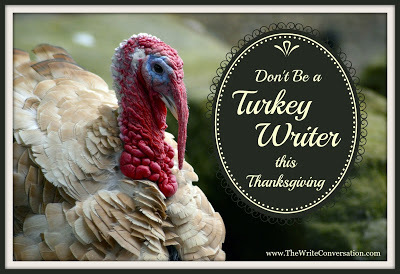 Tis the season of the turkey. If you enjoy eating the Thanksgiving bird, then you love the season. If you’re the turkey, well not so much. You’ve probably spent the past year hatching ways to disguise yourself. For the turkey, I commend his ingenuity. For the turkey-writer, well not so much again. Covering up poor writing habits doesn’t make a good story.
Tis the season of the turkey. If you enjoy eating the Thanksgiving bird, then you love the season. If you’re the turkey, well not so much. You’ve probably spent the past year hatching ways to disguise yourself. For the turkey, I commend his ingenuity. For the turkey-writer, well not so much again. Covering up poor writing habits doesn’t make a good story.
So how can you avoid falling into the category of a turkey-writer and not falling prey to an editor’s ax? Fossils indicate turkeys have been around for around 10 million years. A turkey-writer refuses to change with the times and techniques necessary to be successful in the publishing world.Not choosing to be a wild turkey-writer. These beautifully colored birds can fly. Who wants a ho-hum story that is predictable and lacking in conflict?A turkey’s eyes are located on opposite sides of its head. While this allows the bird to see two objects at once and have wide vision, for the writer that means plot lines that go nowhere.A turkey doesn’t have ears. Instead it has holes behind their eyes. While they have impeccable hearing, a turkey-writer hears everything and can’t focus.A turkey doesn’t have a keen sense of smell or taste. In short they can only discern whether something is sweet, sour, bitter, salty, or acidic. Turkey writers are a bit lazy. They fail to use all the senses so the reader can experience the story. Turkeys are an excellent source of protein and taste good, but what about a full meal? A turkey-writer doesn’t deviate characterization and story lines from one book to the next.Turkeys are highly sensitive to touch in areas of their beak and feet. Do I need to say more? A turkey-writer can’t take criticism and interprets suggestions as being stepped on. Turkeys eat during most of the daylight hours. Turkey-writers refuse to keep their bodies and minds at peak performance.Although only the male turkeys gobble, it is a common problem with turkey-writers. These people complain about the industry and make excuses for their non-published work.The “turkey trot” was created by observing the short jerky steps of a turkey. Don’t be a turkey-writer and not have a plan and a purpose for your craft.When the story is complete, the manuscript needs to be carved or edited to ensure the best flavor for your readers. Have you decided you’ll be eaten in the publishing world, or are you a smart writer who’s looking forward to eating a turkey?
Fossils indicate turkeys have been around for around 10 million years. A turkey-writer refuses to change with the times and techniques necessary to be successful in the publishing world.Not choosing to be a wild turkey-writer. These beautifully colored birds can fly. Who wants a ho-hum story that is predictable and lacking in conflict?A turkey’s eyes are located on opposite sides of its head. While this allows the bird to see two objects at once and have wide vision, for the writer that means plot lines that go nowhere.A turkey doesn’t have ears. Instead it has holes behind their eyes. While they have impeccable hearing, a turkey-writer hears everything and can’t focus.A turkey doesn’t have a keen sense of smell or taste. In short they can only discern whether something is sweet, sour, bitter, salty, or acidic. Turkey writers are a bit lazy. They fail to use all the senses so the reader can experience the story. Turkeys are an excellent source of protein and taste good, but what about a full meal? A turkey-writer doesn’t deviate characterization and story lines from one book to the next.Turkeys are highly sensitive to touch in areas of their beak and feet. Do I need to say more? A turkey-writer can’t take criticism and interprets suggestions as being stepped on. Turkeys eat during most of the daylight hours. Turkey-writers refuse to keep their bodies and minds at peak performance.Although only the male turkeys gobble, it is a common problem with turkey-writers. These people complain about the industry and make excuses for their non-published work.The “turkey trot” was created by observing the short jerky steps of a turkey. Don’t be a turkey-writer and not have a plan and a purpose for your craft.When the story is complete, the manuscript needs to be carved or edited to ensure the best flavor for your readers. Have you decided you’ll be eaten in the publishing world, or are you a smart writer who’s looking forward to eating a turkey?
TWEETABLESAvoid being a turkey-writer & falling prey to an editor’s ax - @DiAnnMills on @EdieMelson (Click to Tweet)
"When the story is complete, it must be carved-edited-to ensure the best flavor for readers" @DiAnnMills (Click to Tweet)
 DiAnn Mills is a bestselling author who believes her readers should expect an adventure. She combines unforgettable characters with unpredictable plots to create action-packed, suspense-filled novels.
DiAnn Mills is a bestselling author who believes her readers should expect an adventure. She combines unforgettable characters with unpredictable plots to create action-packed, suspense-filled novels.
Her titles have appeared on the CBA and ECPA bestseller lists; won two Christy Awards; and been finalists for the RITA, Daphne Du Maurier, Inspirational Readers’ Choice, and Carol award contests. Library Journal presented her with a Best Books 2014: Genre Fiction award in the Christian Fiction category for Firewall.
DiAnn is a founding board member of the American Christian Fiction Writers; the 2015 president of the Romance Writers of America’s Faith, Hope, & Love chapter; a member of Advanced Writers and Speakers Association, and International Thriller Writers. She speaks to various groups and teaches writing workshops around the country. She and her husband live in sunny Houston, Texas.
DiAnn is very active online and would love to connect with readers on any of the social media platforms listed at www.diannmills.com.
 Tis the season of the turkey. If you enjoy eating the Thanksgiving bird, then you love the season. If you’re the turkey, well not so much. You’ve probably spent the past year hatching ways to disguise yourself. For the turkey, I commend his ingenuity. For the turkey-writer, well not so much again. Covering up poor writing habits doesn’t make a good story.
Tis the season of the turkey. If you enjoy eating the Thanksgiving bird, then you love the season. If you’re the turkey, well not so much. You’ve probably spent the past year hatching ways to disguise yourself. For the turkey, I commend his ingenuity. For the turkey-writer, well not so much again. Covering up poor writing habits doesn’t make a good story.So how can you avoid falling into the category of a turkey-writer and not falling prey to an editor’s ax?
 Fossils indicate turkeys have been around for around 10 million years. A turkey-writer refuses to change with the times and techniques necessary to be successful in the publishing world.Not choosing to be a wild turkey-writer. These beautifully colored birds can fly. Who wants a ho-hum story that is predictable and lacking in conflict?A turkey’s eyes are located on opposite sides of its head. While this allows the bird to see two objects at once and have wide vision, for the writer that means plot lines that go nowhere.A turkey doesn’t have ears. Instead it has holes behind their eyes. While they have impeccable hearing, a turkey-writer hears everything and can’t focus.A turkey doesn’t have a keen sense of smell or taste. In short they can only discern whether something is sweet, sour, bitter, salty, or acidic. Turkey writers are a bit lazy. They fail to use all the senses so the reader can experience the story. Turkeys are an excellent source of protein and taste good, but what about a full meal? A turkey-writer doesn’t deviate characterization and story lines from one book to the next.Turkeys are highly sensitive to touch in areas of their beak and feet. Do I need to say more? A turkey-writer can’t take criticism and interprets suggestions as being stepped on. Turkeys eat during most of the daylight hours. Turkey-writers refuse to keep their bodies and minds at peak performance.Although only the male turkeys gobble, it is a common problem with turkey-writers. These people complain about the industry and make excuses for their non-published work.The “turkey trot” was created by observing the short jerky steps of a turkey. Don’t be a turkey-writer and not have a plan and a purpose for your craft.When the story is complete, the manuscript needs to be carved or edited to ensure the best flavor for your readers. Have you decided you’ll be eaten in the publishing world, or are you a smart writer who’s looking forward to eating a turkey?
Fossils indicate turkeys have been around for around 10 million years. A turkey-writer refuses to change with the times and techniques necessary to be successful in the publishing world.Not choosing to be a wild turkey-writer. These beautifully colored birds can fly. Who wants a ho-hum story that is predictable and lacking in conflict?A turkey’s eyes are located on opposite sides of its head. While this allows the bird to see two objects at once and have wide vision, for the writer that means plot lines that go nowhere.A turkey doesn’t have ears. Instead it has holes behind their eyes. While they have impeccable hearing, a turkey-writer hears everything and can’t focus.A turkey doesn’t have a keen sense of smell or taste. In short they can only discern whether something is sweet, sour, bitter, salty, or acidic. Turkey writers are a bit lazy. They fail to use all the senses so the reader can experience the story. Turkeys are an excellent source of protein and taste good, but what about a full meal? A turkey-writer doesn’t deviate characterization and story lines from one book to the next.Turkeys are highly sensitive to touch in areas of their beak and feet. Do I need to say more? A turkey-writer can’t take criticism and interprets suggestions as being stepped on. Turkeys eat during most of the daylight hours. Turkey-writers refuse to keep their bodies and minds at peak performance.Although only the male turkeys gobble, it is a common problem with turkey-writers. These people complain about the industry and make excuses for their non-published work.The “turkey trot” was created by observing the short jerky steps of a turkey. Don’t be a turkey-writer and not have a plan and a purpose for your craft.When the story is complete, the manuscript needs to be carved or edited to ensure the best flavor for your readers. Have you decided you’ll be eaten in the publishing world, or are you a smart writer who’s looking forward to eating a turkey?TWEETABLESAvoid being a turkey-writer & falling prey to an editor’s ax - @DiAnnMills on @EdieMelson (Click to Tweet)
"When the story is complete, it must be carved-edited-to ensure the best flavor for readers" @DiAnnMills (Click to Tweet)
 DiAnn Mills is a bestselling author who believes her readers should expect an adventure. She combines unforgettable characters with unpredictable plots to create action-packed, suspense-filled novels.
DiAnn Mills is a bestselling author who believes her readers should expect an adventure. She combines unforgettable characters with unpredictable plots to create action-packed, suspense-filled novels.Her titles have appeared on the CBA and ECPA bestseller lists; won two Christy Awards; and been finalists for the RITA, Daphne Du Maurier, Inspirational Readers’ Choice, and Carol award contests. Library Journal presented her with a Best Books 2014: Genre Fiction award in the Christian Fiction category for Firewall.
DiAnn is a founding board member of the American Christian Fiction Writers; the 2015 president of the Romance Writers of America’s Faith, Hope, & Love chapter; a member of Advanced Writers and Speakers Association, and International Thriller Writers. She speaks to various groups and teaches writing workshops around the country. She and her husband live in sunny Houston, Texas.
DiAnn is very active online and would love to connect with readers on any of the social media platforms listed at www.diannmills.com.
Published on November 11, 2015 01:00
November 10, 2015
Stepping Up to NaNoWriMo
by Cindy Sproles @CindyDevoted
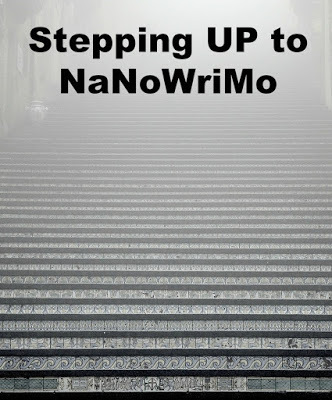 November is National Novel Writing Month. Authors and “would-be” authors accept NaNoWriMo’s challenge to pen a novel in thirty days. 50K words in a month, 1667 words in a day, 833 words in twelve hours, 2.5 words per minute. It’s a very feasible goal.
November is National Novel Writing Month. Authors and “would-be” authors accept NaNoWriMo’s challenge to pen a novel in thirty days. 50K words in a month, 1667 words in a day, 833 words in twelve hours, 2.5 words per minute. It’s a very feasible goal.
NaNoWriMo's mission is valuing enthusiasm, determination, and a deadline. The concept is wonderful. With the right attitude, participants can pound out 50K words in a month. Just to meet the word count goal in 30 days is an accomplishment. Some writers take months, even years, to craft one novel—so committing to putting a full novel on paper speaks a lot for those who actually follow through.
I never attempted NaNoWriMo until this year and here’s why. The thoughts of writing a novel in 30 days is a huge undertaking. But just getting words on the page didn’t, to me, qualify the writing of a good novel.
 NaNoWriMo challenges the writer to get off their duff and do the work. Accepting the challenge means you are willing to first discipline yourself to write daily. Even the most proficient writer will tell you that there are days writing anything is a challenge – even a chore. So when you sign on with NaNoWriMo, you are willing to discipline yourself to write every day. This is a good thing. In fact, it’s wonderful. Writing mentors stress the importance of writing every day.
NaNoWriMo challenges the writer to get off their duff and do the work. Accepting the challenge means you are willing to first discipline yourself to write daily. Even the most proficient writer will tell you that there are days writing anything is a challenge – even a chore. So when you sign on with NaNoWriMo, you are willing to discipline yourself to write every day. This is a good thing. In fact, it’s wonderful. Writing mentors stress the importance of writing every day.
So where are my concerns? There are a few questions I’d like every writer to consider – especially new writers. I want you to accept the challenge in the right frame of mind and with a full understanding of the pros and cons. My desire is for your writing experience to be joyful, not stressful.
Consider these questions before you begin your NaNoWriMo challenge:
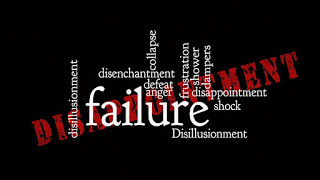 What if I fail to hit the writing goal?: Don’t feel as though you are a failure. The only way you fail, is if you
choose
not to uphold your commitment intentionally. There are times life happens. A sick child, accidents, work. Sometimes the story doesn’t jell like it should and it throws things off. These things are understandable and if they prevent you from hitting your goal it’s not by your own negligence. You haven’t failed the writing goal. It’s a matter of choice. When life hits you are not hurting your efforts, but to blatantly ignore your personal commitments is unfair to you as a writer.
What if I fail to hit the writing goal?: Don’t feel as though you are a failure. The only way you fail, is if you
choose
not to uphold your commitment intentionally. There are times life happens. A sick child, accidents, work. Sometimes the story doesn’t jell like it should and it throws things off. These things are understandable and if they prevent you from hitting your goal it’s not by your own negligence. You haven’t failed the writing goal. It’s a matter of choice. When life hits you are not hurting your efforts, but to blatantly ignore your personal commitments is unfair to you as a writer.
If the story begins to fall apart: then word count is no longer an issue. Story trumps. Pushing through on a failing storyline breeds frustration. Characters move into chaos and the plot wains when the story falls apart. At this point, stop. Rethink your work. Don’t allow the guilt of writing 2000 words daily stalk after you like a thief in the night. There is nothing harder than completing a work that is substandard because you felt rushed. Slow down, take a deep breath. Contact your critique partners and iron out the issues. A solid story is much more important than word count.
Honor the craft: I’m all for getting the words on the page, AS LONG AS I know where the words are going. It’s okay to get them down while they flow, but don’t take for granted the art of writing. Don’t fall prey to dumping words on a page and then expecting to cut the junk at a later date. There’s more to your writing than cutting. There’s the mechanics and grammar, character development, and plot line. As you write, keep your craft in check. Don’t throw random things on the page for the sake of word count. You may manage to write a book in 30 days but end up rewriting a book for months. Your manuscript doesn’t have to be perfect, but just because you are on a deadline doesn’t mean you slack on the important parts of writing.
If you need help, get it: This is especially important for new writers. Don’t let word count pressure you if you are having trouble. Critique partners and groups are wonderful to help you. It’s important to realize when you need assistance getting over a hump than to overwrite or underwrite your story. No one will judge you if you don’t make your word count due to a problem with a character or plot.
Respect the deadline: Of course one of the goals of NaNoWriMo is to encourage you to meet a deadline. It’s a valuable lesson to learn as you begin to submit your work to magazines, editors, or blogs. If your story is going well, then it never hurts to push your limits to meet the deadline. But more so, NaNoWriMo helps you set the discipline of writing daily. It’s true that it’s easier to eat an elephant in small bites and breaking a 50K word novel into small bites makes it feasible . . . doable. . . attainable.
The important thing is, you realize NaNoWriMo is a tool to help groom your writing habits. It’s not a judgment device. It’s not a pass or fail test. It’s a process, a teaching means to tweak you and your growth and betterment of the craft.
Go ahead. Step up and challenge yourself. But challenge yourself in the right attitude so you progress in your understanding of the craft of writing.
What has NaNoWriMo taught you? Be sure to share your thoughts in the comments section below.
TWEETABLES
#NaNoWriMo isn't a pass/fail test - use it to grow as a writer - @CindyDevoted (Click to Tweet)
Questions to ask before you begin #NaNoWriMo - @CindyDevoted on @EdieMelson (Click to Tweet)
 Cindy Sproles is an author and popular speaker. She is the cofounder of Christian Devotions ministries and managing editor of Straight Street Books and SonRise Devotionals, imprints of Lighthouse Publishing of the Carolinas. Cindy is the executive editor of www.christiandevotions.us and www.inspireafire.com. She teaches at writers conferences nationwide and directs The Asheville Christian Writers Conference - Writers Boot Camp.
Cindy Sproles is an author and popular speaker. She is the cofounder of Christian Devotions ministries and managing editor of Straight Street Books and SonRise Devotionals, imprints of Lighthouse Publishing of the Carolinas. Cindy is the executive editor of www.christiandevotions.us and www.inspireafire.com. She teaches at writers conferences nationwide and directs The Asheville Christian Writers Conference - Writers Boot Camp.
She is the author of two devotionals, He Said, She Said - Learning to Live a Life of Passion and New Sheets - Thirty Days to Refine You into the Woman You Can Be. Cindy's debut novel, Mercy's Rain, is available at major retailers. Visit Cindy at www.cindysproles.com and book her for your next conference or ladies retreat. Also connect with her on Facebook and Twitter.
 November is National Novel Writing Month. Authors and “would-be” authors accept NaNoWriMo’s challenge to pen a novel in thirty days. 50K words in a month, 1667 words in a day, 833 words in twelve hours, 2.5 words per minute. It’s a very feasible goal.
November is National Novel Writing Month. Authors and “would-be” authors accept NaNoWriMo’s challenge to pen a novel in thirty days. 50K words in a month, 1667 words in a day, 833 words in twelve hours, 2.5 words per minute. It’s a very feasible goal.NaNoWriMo's mission is valuing enthusiasm, determination, and a deadline. The concept is wonderful. With the right attitude, participants can pound out 50K words in a month. Just to meet the word count goal in 30 days is an accomplishment. Some writers take months, even years, to craft one novel—so committing to putting a full novel on paper speaks a lot for those who actually follow through.
I never attempted NaNoWriMo until this year and here’s why. The thoughts of writing a novel in 30 days is a huge undertaking. But just getting words on the page didn’t, to me, qualify the writing of a good novel.
 NaNoWriMo challenges the writer to get off their duff and do the work. Accepting the challenge means you are willing to first discipline yourself to write daily. Even the most proficient writer will tell you that there are days writing anything is a challenge – even a chore. So when you sign on with NaNoWriMo, you are willing to discipline yourself to write every day. This is a good thing. In fact, it’s wonderful. Writing mentors stress the importance of writing every day.
NaNoWriMo challenges the writer to get off their duff and do the work. Accepting the challenge means you are willing to first discipline yourself to write daily. Even the most proficient writer will tell you that there are days writing anything is a challenge – even a chore. So when you sign on with NaNoWriMo, you are willing to discipline yourself to write every day. This is a good thing. In fact, it’s wonderful. Writing mentors stress the importance of writing every day.So where are my concerns? There are a few questions I’d like every writer to consider – especially new writers. I want you to accept the challenge in the right frame of mind and with a full understanding of the pros and cons. My desire is for your writing experience to be joyful, not stressful.
Consider these questions before you begin your NaNoWriMo challenge:
 What if I fail to hit the writing goal?: Don’t feel as though you are a failure. The only way you fail, is if you
choose
not to uphold your commitment intentionally. There are times life happens. A sick child, accidents, work. Sometimes the story doesn’t jell like it should and it throws things off. These things are understandable and if they prevent you from hitting your goal it’s not by your own negligence. You haven’t failed the writing goal. It’s a matter of choice. When life hits you are not hurting your efforts, but to blatantly ignore your personal commitments is unfair to you as a writer.
What if I fail to hit the writing goal?: Don’t feel as though you are a failure. The only way you fail, is if you
choose
not to uphold your commitment intentionally. There are times life happens. A sick child, accidents, work. Sometimes the story doesn’t jell like it should and it throws things off. These things are understandable and if they prevent you from hitting your goal it’s not by your own negligence. You haven’t failed the writing goal. It’s a matter of choice. When life hits you are not hurting your efforts, but to blatantly ignore your personal commitments is unfair to you as a writer. If the story begins to fall apart: then word count is no longer an issue. Story trumps. Pushing through on a failing storyline breeds frustration. Characters move into chaos and the plot wains when the story falls apart. At this point, stop. Rethink your work. Don’t allow the guilt of writing 2000 words daily stalk after you like a thief in the night. There is nothing harder than completing a work that is substandard because you felt rushed. Slow down, take a deep breath. Contact your critique partners and iron out the issues. A solid story is much more important than word count.
Honor the craft: I’m all for getting the words on the page, AS LONG AS I know where the words are going. It’s okay to get them down while they flow, but don’t take for granted the art of writing. Don’t fall prey to dumping words on a page and then expecting to cut the junk at a later date. There’s more to your writing than cutting. There’s the mechanics and grammar, character development, and plot line. As you write, keep your craft in check. Don’t throw random things on the page for the sake of word count. You may manage to write a book in 30 days but end up rewriting a book for months. Your manuscript doesn’t have to be perfect, but just because you are on a deadline doesn’t mean you slack on the important parts of writing.
If you need help, get it: This is especially important for new writers. Don’t let word count pressure you if you are having trouble. Critique partners and groups are wonderful to help you. It’s important to realize when you need assistance getting over a hump than to overwrite or underwrite your story. No one will judge you if you don’t make your word count due to a problem with a character or plot.
Respect the deadline: Of course one of the goals of NaNoWriMo is to encourage you to meet a deadline. It’s a valuable lesson to learn as you begin to submit your work to magazines, editors, or blogs. If your story is going well, then it never hurts to push your limits to meet the deadline. But more so, NaNoWriMo helps you set the discipline of writing daily. It’s true that it’s easier to eat an elephant in small bites and breaking a 50K word novel into small bites makes it feasible . . . doable. . . attainable.
The important thing is, you realize NaNoWriMo is a tool to help groom your writing habits. It’s not a judgment device. It’s not a pass or fail test. It’s a process, a teaching means to tweak you and your growth and betterment of the craft.
Go ahead. Step up and challenge yourself. But challenge yourself in the right attitude so you progress in your understanding of the craft of writing.
What has NaNoWriMo taught you? Be sure to share your thoughts in the comments section below.
TWEETABLES
#NaNoWriMo isn't a pass/fail test - use it to grow as a writer - @CindyDevoted (Click to Tweet)
Questions to ask before you begin #NaNoWriMo - @CindyDevoted on @EdieMelson (Click to Tweet)
 Cindy Sproles is an author and popular speaker. She is the cofounder of Christian Devotions ministries and managing editor of Straight Street Books and SonRise Devotionals, imprints of Lighthouse Publishing of the Carolinas. Cindy is the executive editor of www.christiandevotions.us and www.inspireafire.com. She teaches at writers conferences nationwide and directs The Asheville Christian Writers Conference - Writers Boot Camp.
Cindy Sproles is an author and popular speaker. She is the cofounder of Christian Devotions ministries and managing editor of Straight Street Books and SonRise Devotionals, imprints of Lighthouse Publishing of the Carolinas. Cindy is the executive editor of www.christiandevotions.us and www.inspireafire.com. She teaches at writers conferences nationwide and directs The Asheville Christian Writers Conference - Writers Boot Camp. She is the author of two devotionals, He Said, She Said - Learning to Live a Life of Passion and New Sheets - Thirty Days to Refine You into the Woman You Can Be. Cindy's debut novel, Mercy's Rain, is available at major retailers. Visit Cindy at www.cindysproles.com and book her for your next conference or ladies retreat. Also connect with her on Facebook and Twitter.
Published on November 10, 2015 01:00
November 9, 2015
The Basics of Commenting and Answering Comments on a Blog—Blogging Basics for Writers, Part 9
by Edie Melson @EdieMelson
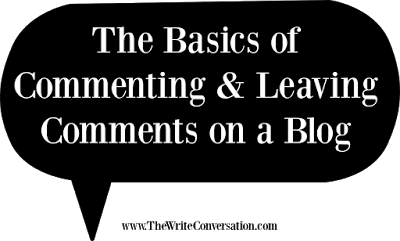 Blogging is a great way to build an online community—when you take time to learn how to do it right. Part of the things you need to learn including how to write a focused post, how to keep to a schedule, how to facilitate conversation with open-ended questions and today’s topic, the etiquette of commenting.
Blogging is a great way to build an online community—when you take time to learn how to do it right. Part of the things you need to learn including how to write a focused post, how to keep to a schedule, how to facilitate conversation with open-ended questions and today’s topic, the etiquette of commenting.
It’s important to know the dos and don’ts of commenting because part of growing your blog means you’ll be leaving comments on other sites, as well as replying to comments on your on site.
The etiquette involved isn’t complicated. As a matter of fact, I think it’s fairly intuitive. Most of us do the right things most of the time. But there are some things we may over look. Today’s post is designed to help you learn the etiquette of commenting for the blogger and the reader.Etiquette When Leaving a CommentBe Specific. Let the blogger know what about the post resonated—or didn’t—with you. Stay Focused. This isn’t the place to write your own blog post. It’s fine to ask questions or share a thought or two, but be careful, make sure what you’re writing is in direct response to the post.Be Brief. Usually, less is more when it comes to blog comments. There are exceptions. In the past few days a couple of my blogs have gathered longer comments. I specifically asked for my readers to share their thoughts on difficult subjects. In that type of situation, long is fine.No Links. The quickest way to get labeled as spam from a website spam filter is to leave a link to your own site. When you sign in and leave a comment, most of the time your name is linked to your own site. If someone wants to find out more about you, or get to know you better, they can click on your name. Again, there are exceptions. If someone responds and asks you for a link to something you mentioned in a comment, then it’s fine. But it may take longer for your answer to show up because the blog owner will probably have to dig it out of the spam folder.Be Nice. I really shouldn’t have to say this, but it’s important to keep things civil. Remember this truth, What happens on the Internet, STAYS on the Internet. That includes blog comments. It’s fine to disagree, but keep it polite.Try NOT to Be Anonymous. Sometimes anonymous is the only way you can leave a comment. If that’s the case, end your comment with your name. That makes it easier for the blogger to answer you. This also applies if your commenting name is something other than your name.
Stay Focused. This isn’t the place to write your own blog post. It’s fine to ask questions or share a thought or two, but be careful, make sure what you’re writing is in direct response to the post.Be Brief. Usually, less is more when it comes to blog comments. There are exceptions. In the past few days a couple of my blogs have gathered longer comments. I specifically asked for my readers to share their thoughts on difficult subjects. In that type of situation, long is fine.No Links. The quickest way to get labeled as spam from a website spam filter is to leave a link to your own site. When you sign in and leave a comment, most of the time your name is linked to your own site. If someone wants to find out more about you, or get to know you better, they can click on your name. Again, there are exceptions. If someone responds and asks you for a link to something you mentioned in a comment, then it’s fine. But it may take longer for your answer to show up because the blog owner will probably have to dig it out of the spam folder.Be Nice. I really shouldn’t have to say this, but it’s important to keep things civil. Remember this truth, What happens on the Internet, STAYS on the Internet. That includes blog comments. It’s fine to disagree, but keep it polite.Try NOT to Be Anonymous. Sometimes anonymous is the only way you can leave a comment. If that’s the case, end your comment with your name. That makes it easier for the blogger to answer you. This also applies if your commenting name is something other than your name.
Etiquette When Answering a CommentThank the Commenter, by Name If someone took time to read your blog post AND comment, the least you can do is thank them. It is okay to answer several commenters at once if you find yourself inundated with comments. But if you do that, be sure to refer to the commenters by name. If it’s not possible because they didn’t leave a name, try to make the reference obvious so they know they weren’t ignored.Be Specific. When possible, refer to something they said in the comment. Let them know you value their insight or how their thoughts made you consider something new. Answer Questions. Often commenters will ask questions on my site. Sometimes they comment on old posts and ask questions there. No matter how old the post, I always try answer the question. If it’s a topic I already have a blog post written about, I’ll tell them to expect the answer in an upcoming post.Be Nice. Sometimes commenters can touch a nerve, either by disagreeing or by the phrasing they use, or the fact that they go on and on…and on. No matter what, take the high road and stay civil. You don’t have to agree, but practice the art of civil disagreement.Leave a Link. When you own the blog, you can include a link in a comment. If you have a blog post that clarifies something for the commenter, it’s fine to leave a link.Be Brief.Don’t give in to the temptation to write another post when you answer a comment. Refer to one or two things, thank them for their comment, and sign off.
Answer Questions. Often commenters will ask questions on my site. Sometimes they comment on old posts and ask questions there. No matter how old the post, I always try answer the question. If it’s a topic I already have a blog post written about, I’ll tell them to expect the answer in an upcoming post.Be Nice. Sometimes commenters can touch a nerve, either by disagreeing or by the phrasing they use, or the fact that they go on and on…and on. No matter what, take the high road and stay civil. You don’t have to agree, but practice the art of civil disagreement.Leave a Link. When you own the blog, you can include a link in a comment. If you have a blog post that clarifies something for the commenter, it’s fine to leave a link.Be Brief.Don’t give in to the temptation to write another post when you answer a comment. Refer to one or two things, thank them for their comment, and sign off.
What else would you add to these tips? Be sure to leave your things in the comments section below.
Don't forget to join the conversation!
Blessings,
Edie
TWEETABLES
Add to your online platform by commenting on other sites - @EdieMelson (Click to Tweet)
The Basics of Commenting and Answering Comments on a Blog - @EdieMelson (Click to Tweet)
Blogging Basics For Writers: If you've missed the previous posts in this series, here are the direct links:
Part 1 - Blog or Website, Which Does a Writer Really Need
Part 2 - So What Do I Blog About
Part 3 - The Dos & Don'ts of Blogging
Part 4 - How to Label and Tag Your Blog Posts
Part 5 - How Fast Should a Blog Grow
Part 6 - Tips for Getting More Comments on Your Blog
Part 7 - What do I Need in My Blog's Sidebar
Part 8 - Blogging Success is as Easy as ABC
 Blogging is a great way to build an online community—when you take time to learn how to do it right. Part of the things you need to learn including how to write a focused post, how to keep to a schedule, how to facilitate conversation with open-ended questions and today’s topic, the etiquette of commenting.
Blogging is a great way to build an online community—when you take time to learn how to do it right. Part of the things you need to learn including how to write a focused post, how to keep to a schedule, how to facilitate conversation with open-ended questions and today’s topic, the etiquette of commenting.It’s important to know the dos and don’ts of commenting because part of growing your blog means you’ll be leaving comments on other sites, as well as replying to comments on your on site.
The etiquette involved isn’t complicated. As a matter of fact, I think it’s fairly intuitive. Most of us do the right things most of the time. But there are some things we may over look. Today’s post is designed to help you learn the etiquette of commenting for the blogger and the reader.Etiquette When Leaving a CommentBe Specific. Let the blogger know what about the post resonated—or didn’t—with you.
 Stay Focused. This isn’t the place to write your own blog post. It’s fine to ask questions or share a thought or two, but be careful, make sure what you’re writing is in direct response to the post.Be Brief. Usually, less is more when it comes to blog comments. There are exceptions. In the past few days a couple of my blogs have gathered longer comments. I specifically asked for my readers to share their thoughts on difficult subjects. In that type of situation, long is fine.No Links. The quickest way to get labeled as spam from a website spam filter is to leave a link to your own site. When you sign in and leave a comment, most of the time your name is linked to your own site. If someone wants to find out more about you, or get to know you better, they can click on your name. Again, there are exceptions. If someone responds and asks you for a link to something you mentioned in a comment, then it’s fine. But it may take longer for your answer to show up because the blog owner will probably have to dig it out of the spam folder.Be Nice. I really shouldn’t have to say this, but it’s important to keep things civil. Remember this truth, What happens on the Internet, STAYS on the Internet. That includes blog comments. It’s fine to disagree, but keep it polite.Try NOT to Be Anonymous. Sometimes anonymous is the only way you can leave a comment. If that’s the case, end your comment with your name. That makes it easier for the blogger to answer you. This also applies if your commenting name is something other than your name.
Stay Focused. This isn’t the place to write your own blog post. It’s fine to ask questions or share a thought or two, but be careful, make sure what you’re writing is in direct response to the post.Be Brief. Usually, less is more when it comes to blog comments. There are exceptions. In the past few days a couple of my blogs have gathered longer comments. I specifically asked for my readers to share their thoughts on difficult subjects. In that type of situation, long is fine.No Links. The quickest way to get labeled as spam from a website spam filter is to leave a link to your own site. When you sign in and leave a comment, most of the time your name is linked to your own site. If someone wants to find out more about you, or get to know you better, they can click on your name. Again, there are exceptions. If someone responds and asks you for a link to something you mentioned in a comment, then it’s fine. But it may take longer for your answer to show up because the blog owner will probably have to dig it out of the spam folder.Be Nice. I really shouldn’t have to say this, but it’s important to keep things civil. Remember this truth, What happens on the Internet, STAYS on the Internet. That includes blog comments. It’s fine to disagree, but keep it polite.Try NOT to Be Anonymous. Sometimes anonymous is the only way you can leave a comment. If that’s the case, end your comment with your name. That makes it easier for the blogger to answer you. This also applies if your commenting name is something other than your name. Etiquette When Answering a CommentThank the Commenter, by Name If someone took time to read your blog post AND comment, the least you can do is thank them. It is okay to answer several commenters at once if you find yourself inundated with comments. But if you do that, be sure to refer to the commenters by name. If it’s not possible because they didn’t leave a name, try to make the reference obvious so they know they weren’t ignored.Be Specific. When possible, refer to something they said in the comment. Let them know you value their insight or how their thoughts made you consider something new.
 Answer Questions. Often commenters will ask questions on my site. Sometimes they comment on old posts and ask questions there. No matter how old the post, I always try answer the question. If it’s a topic I already have a blog post written about, I’ll tell them to expect the answer in an upcoming post.Be Nice. Sometimes commenters can touch a nerve, either by disagreeing or by the phrasing they use, or the fact that they go on and on…and on. No matter what, take the high road and stay civil. You don’t have to agree, but practice the art of civil disagreement.Leave a Link. When you own the blog, you can include a link in a comment. If you have a blog post that clarifies something for the commenter, it’s fine to leave a link.Be Brief.Don’t give in to the temptation to write another post when you answer a comment. Refer to one or two things, thank them for their comment, and sign off.
Answer Questions. Often commenters will ask questions on my site. Sometimes they comment on old posts and ask questions there. No matter how old the post, I always try answer the question. If it’s a topic I already have a blog post written about, I’ll tell them to expect the answer in an upcoming post.Be Nice. Sometimes commenters can touch a nerve, either by disagreeing or by the phrasing they use, or the fact that they go on and on…and on. No matter what, take the high road and stay civil. You don’t have to agree, but practice the art of civil disagreement.Leave a Link. When you own the blog, you can include a link in a comment. If you have a blog post that clarifies something for the commenter, it’s fine to leave a link.Be Brief.Don’t give in to the temptation to write another post when you answer a comment. Refer to one or two things, thank them for their comment, and sign off.What else would you add to these tips? Be sure to leave your things in the comments section below.
Don't forget to join the conversation!
Blessings,
Edie
TWEETABLES
Add to your online platform by commenting on other sites - @EdieMelson (Click to Tweet)
The Basics of Commenting and Answering Comments on a Blog - @EdieMelson (Click to Tweet)
Blogging Basics For Writers: If you've missed the previous posts in this series, here are the direct links:
Part 1 - Blog or Website, Which Does a Writer Really Need
Part 2 - So What Do I Blog About
Part 3 - The Dos & Don'ts of Blogging
Part 4 - How to Label and Tag Your Blog Posts
Part 5 - How Fast Should a Blog Grow
Part 6 - Tips for Getting More Comments on Your Blog
Part 7 - What do I Need in My Blog's Sidebar
Part 8 - Blogging Success is as Easy as ABC
Published on November 09, 2015 01:00
The Basics of Commenting and Answering Comments on a Blog—Blogging Basics for Writers, Part 8
by Edie Melson @EdieMelson
 Blogging is a great way to build an online community—when you take time to learn how to do it right. Part of the things you need to learn including how to write a focused post, how to keep to a schedule, how to facilitate conversation with open-ended questions and today’s topic, the etiquette of commenting.
Blogging is a great way to build an online community—when you take time to learn how to do it right. Part of the things you need to learn including how to write a focused post, how to keep to a schedule, how to facilitate conversation with open-ended questions and today’s topic, the etiquette of commenting.
It’s important to know the dos and don’ts of commenting because part of growing your blog means you’ll be leaving comments on other sites, as well as replying to comments on your on site.
The etiquette involved isn’t complicated. As a matter of fact, I think it’s fairly intuitive. Most of us do the right things most of the time. But there are some things we may over look. Today’s post is designed to help you learn the etiquette of commenting for the blogger and the reader.Etiquette When Leaving a CommentBe Specific. Let the blogger know what about the post resonated—or didn’t—with you. Stay Focused. This isn’t the place to write your own blog post. It’s fine to ask questions or share a thought or two, but be careful, make sure what you’re writing is in direct response to the post.Be Brief. Usually, less is more when it comes to blog comments. There are exceptions. In the past few days a couple of my blogs have gathered longer comments. I specifically asked for my readers to share their thoughts on difficult subjects. In that type of situation, long is fine.No Links. The quickest way to get labeled as spam from a website spam filter is to leave a link to your own site. When you sign in and leave a comment, most of the time your name is linked to your own site. If someone wants to find out more about you, or get to know you better, they can click on your name. Again, there are exceptions. If someone responds and asks you for a link to something you mentioned in a comment, then it’s fine. But it may take longer for your answer to show up because the blog owner will probably have to dig it out of the spam folder.Be Nice. I really shouldn’t have to say this, but it’s important to keep things civil. Remember this truth, What happens on the Internet, STAYS on the Internet. That includes blog comments. It’s fine to disagree, but keep it polite.Try NOT to Be Anonymous. Sometimes anonymous is the only way you can leave a comment. If that’s the case, end your comment with your name. That makes it easier for the blogger to answer you. This also applies if your commenting name is something other than your name.
Stay Focused. This isn’t the place to write your own blog post. It’s fine to ask questions or share a thought or two, but be careful, make sure what you’re writing is in direct response to the post.Be Brief. Usually, less is more when it comes to blog comments. There are exceptions. In the past few days a couple of my blogs have gathered longer comments. I specifically asked for my readers to share their thoughts on difficult subjects. In that type of situation, long is fine.No Links. The quickest way to get labeled as spam from a website spam filter is to leave a link to your own site. When you sign in and leave a comment, most of the time your name is linked to your own site. If someone wants to find out more about you, or get to know you better, they can click on your name. Again, there are exceptions. If someone responds and asks you for a link to something you mentioned in a comment, then it’s fine. But it may take longer for your answer to show up because the blog owner will probably have to dig it out of the spam folder.Be Nice. I really shouldn’t have to say this, but it’s important to keep things civil. Remember this truth, What happens on the Internet, STAYS on the Internet. That includes blog comments. It’s fine to disagree, but keep it polite.Try NOT to Be Anonymous. Sometimes anonymous is the only way you can leave a comment. If that’s the case, end your comment with your name. That makes it easier for the blogger to answer you. This also applies if your commenting name is something other than your name.
Etiquette When Answering a CommentThank the Commenter, by Name If someone took time to read your blog post AND comment, the least you can do is thank them. It is okay to answer several commenters at once if you find yourself inundated with comments. But if you do that, be sure to refer to the commenters by name. If it’s not possible because they didn’t leave a name, try to make the reference obvious so they know they weren’t ignored.Be Specific. When possible, refer to something they said in the comment. Let them know you value their insight or how their thoughts made you consider something new. Answer Questions. Often commenters will ask questions on my site. Sometimes they comment on old posts and ask questions there. No matter how old the post, I always try answer the question. If it’s a topic I already have a blog post written about, I’ll tell them to expect the answer in an upcoming post.Be Nice. Sometimes commenters can touch a nerve, either by disagreeing or by the phrasing they use, or the fact that they go on and on…and on. No matter what, take the high road and stay civil. You don’t have to agree, but practice the art of civil disagreement.Leave a Link. When you own the blog, you can include a link in a comment. If you have a blog post that clarifies something for the commenter, it’s fine to leave a link.Be Brief.Don’t give in to the temptation to write another post when you answer a comment. Refer to one or two things, thank them for their comment, and sign off.
Answer Questions. Often commenters will ask questions on my site. Sometimes they comment on old posts and ask questions there. No matter how old the post, I always try answer the question. If it’s a topic I already have a blog post written about, I’ll tell them to expect the answer in an upcoming post.Be Nice. Sometimes commenters can touch a nerve, either by disagreeing or by the phrasing they use, or the fact that they go on and on…and on. No matter what, take the high road and stay civil. You don’t have to agree, but practice the art of civil disagreement.Leave a Link. When you own the blog, you can include a link in a comment. If you have a blog post that clarifies something for the commenter, it’s fine to leave a link.Be Brief.Don’t give in to the temptation to write another post when you answer a comment. Refer to one or two things, thank them for their comment, and sign off.
What else would you add to these tips? Be sure to leave your things in the comments section below.
Don't forget to join the conversation!
Blessings,
Edie
TWEETABLES
Add to your online platform by commenting on other sites - @EdieMelson (Click to Tweet)
The Basics of Commenting and Answering Comments on a Blog - @EdieMelson (Click to Tweet)
Blogging Basics For Writers: If you've missed the previous posts in this series, here are the direct links:
Part 1 - Blog or Website, Which Does a Writer Really Need
Part 2 - So What Do I Blog About
Part 3 - The Dos & Don'ts of Blogging
Part 4 - How Fast Should a Blog Grow
Part 5 - Tips for Getting More Comments on Your Blog
Part 6 - What do I Need in My Blog's Sidebar
Part 7 - Blogging Success is as Easy as ABC
 Blogging is a great way to build an online community—when you take time to learn how to do it right. Part of the things you need to learn including how to write a focused post, how to keep to a schedule, how to facilitate conversation with open-ended questions and today’s topic, the etiquette of commenting.
Blogging is a great way to build an online community—when you take time to learn how to do it right. Part of the things you need to learn including how to write a focused post, how to keep to a schedule, how to facilitate conversation with open-ended questions and today’s topic, the etiquette of commenting.It’s important to know the dos and don’ts of commenting because part of growing your blog means you’ll be leaving comments on other sites, as well as replying to comments on your on site.
The etiquette involved isn’t complicated. As a matter of fact, I think it’s fairly intuitive. Most of us do the right things most of the time. But there are some things we may over look. Today’s post is designed to help you learn the etiquette of commenting for the blogger and the reader.Etiquette When Leaving a CommentBe Specific. Let the blogger know what about the post resonated—or didn’t—with you.
 Stay Focused. This isn’t the place to write your own blog post. It’s fine to ask questions or share a thought or two, but be careful, make sure what you’re writing is in direct response to the post.Be Brief. Usually, less is more when it comes to blog comments. There are exceptions. In the past few days a couple of my blogs have gathered longer comments. I specifically asked for my readers to share their thoughts on difficult subjects. In that type of situation, long is fine.No Links. The quickest way to get labeled as spam from a website spam filter is to leave a link to your own site. When you sign in and leave a comment, most of the time your name is linked to your own site. If someone wants to find out more about you, or get to know you better, they can click on your name. Again, there are exceptions. If someone responds and asks you for a link to something you mentioned in a comment, then it’s fine. But it may take longer for your answer to show up because the blog owner will probably have to dig it out of the spam folder.Be Nice. I really shouldn’t have to say this, but it’s important to keep things civil. Remember this truth, What happens on the Internet, STAYS on the Internet. That includes blog comments. It’s fine to disagree, but keep it polite.Try NOT to Be Anonymous. Sometimes anonymous is the only way you can leave a comment. If that’s the case, end your comment with your name. That makes it easier for the blogger to answer you. This also applies if your commenting name is something other than your name.
Stay Focused. This isn’t the place to write your own blog post. It’s fine to ask questions or share a thought or two, but be careful, make sure what you’re writing is in direct response to the post.Be Brief. Usually, less is more when it comes to blog comments. There are exceptions. In the past few days a couple of my blogs have gathered longer comments. I specifically asked for my readers to share their thoughts on difficult subjects. In that type of situation, long is fine.No Links. The quickest way to get labeled as spam from a website spam filter is to leave a link to your own site. When you sign in and leave a comment, most of the time your name is linked to your own site. If someone wants to find out more about you, or get to know you better, they can click on your name. Again, there are exceptions. If someone responds and asks you for a link to something you mentioned in a comment, then it’s fine. But it may take longer for your answer to show up because the blog owner will probably have to dig it out of the spam folder.Be Nice. I really shouldn’t have to say this, but it’s important to keep things civil. Remember this truth, What happens on the Internet, STAYS on the Internet. That includes blog comments. It’s fine to disagree, but keep it polite.Try NOT to Be Anonymous. Sometimes anonymous is the only way you can leave a comment. If that’s the case, end your comment with your name. That makes it easier for the blogger to answer you. This also applies if your commenting name is something other than your name. Etiquette When Answering a CommentThank the Commenter, by Name If someone took time to read your blog post AND comment, the least you can do is thank them. It is okay to answer several commenters at once if you find yourself inundated with comments. But if you do that, be sure to refer to the commenters by name. If it’s not possible because they didn’t leave a name, try to make the reference obvious so they know they weren’t ignored.Be Specific. When possible, refer to something they said in the comment. Let them know you value their insight or how their thoughts made you consider something new.
 Answer Questions. Often commenters will ask questions on my site. Sometimes they comment on old posts and ask questions there. No matter how old the post, I always try answer the question. If it’s a topic I already have a blog post written about, I’ll tell them to expect the answer in an upcoming post.Be Nice. Sometimes commenters can touch a nerve, either by disagreeing or by the phrasing they use, or the fact that they go on and on…and on. No matter what, take the high road and stay civil. You don’t have to agree, but practice the art of civil disagreement.Leave a Link. When you own the blog, you can include a link in a comment. If you have a blog post that clarifies something for the commenter, it’s fine to leave a link.Be Brief.Don’t give in to the temptation to write another post when you answer a comment. Refer to one or two things, thank them for their comment, and sign off.
Answer Questions. Often commenters will ask questions on my site. Sometimes they comment on old posts and ask questions there. No matter how old the post, I always try answer the question. If it’s a topic I already have a blog post written about, I’ll tell them to expect the answer in an upcoming post.Be Nice. Sometimes commenters can touch a nerve, either by disagreeing or by the phrasing they use, or the fact that they go on and on…and on. No matter what, take the high road and stay civil. You don’t have to agree, but practice the art of civil disagreement.Leave a Link. When you own the blog, you can include a link in a comment. If you have a blog post that clarifies something for the commenter, it’s fine to leave a link.Be Brief.Don’t give in to the temptation to write another post when you answer a comment. Refer to one or two things, thank them for their comment, and sign off.What else would you add to these tips? Be sure to leave your things in the comments section below.
Don't forget to join the conversation!
Blessings,
Edie
TWEETABLES
Add to your online platform by commenting on other sites - @EdieMelson (Click to Tweet)
The Basics of Commenting and Answering Comments on a Blog - @EdieMelson (Click to Tweet)
Blogging Basics For Writers: If you've missed the previous posts in this series, here are the direct links:
Part 1 - Blog or Website, Which Does a Writer Really Need
Part 2 - So What Do I Blog About
Part 3 - The Dos & Don'ts of Blogging
Part 4 - How Fast Should a Blog Grow
Part 5 - Tips for Getting More Comments on Your Blog
Part 6 - What do I Need in My Blog's Sidebar
Part 7 - Blogging Success is as Easy as ABC
Published on November 09, 2015 01:00
November 8, 2015
A Sweet Aroma
by Sarah Van Diest
 We sat around the long, wooden table talking about life. Breakfast for dinner is the best, everyone agreed. It’s like getting to have dessert as the meal. Eggs and sausage bring a bit of balance to the pancakes and pastries. It’s like cheating, but not… or maybe I just want to believe it’s not. Either way, we all agreed, breakfast for dinner is the best.
We sat around the long, wooden table talking about life. Breakfast for dinner is the best, everyone agreed. It’s like getting to have dessert as the meal. Eggs and sausage bring a bit of balance to the pancakes and pastries. It’s like cheating, but not… or maybe I just want to believe it’s not. Either way, we all agreed, breakfast for dinner is the best.
Each person at the table had stories to share. Each life had been impacted by events and circumstances, people and relationships, health and wealth, or the lack thereof. Telling our tales can be clumsy. We feel the pressure of time, not wanting to take too much of it; we feel the urge to hold back or put a happy face on while we speak; we feel the desire to be understood and even more strongly, not to be misunderstood. But each one has a story.A meshing takes place with the stories as they pour out on the table and blend and mix with the others. Details may be lost and specifics combined or fused, but rising out of this melting pot is a scent familiar to us all. We recognize it. The aroma that fills the air and makes its way to our souls is the distinct smell of our humanity.
 I can see your face may have just cringed at the thought of smelling such a thing. Your nose squinched a bit and wrinkled up. We tend to have an aversion to the thought of our humanity. It seems to us to be something unclean, dirty and somehow reminiscent of swine. At least that’s what my imagination proclaims. I understand that. We are dirty in many respects. We have soiled many things by the works of our hands and the words from our lips. But does that mean we are dirty?
I can see your face may have just cringed at the thought of smelling such a thing. Your nose squinched a bit and wrinkled up. We tend to have an aversion to the thought of our humanity. It seems to us to be something unclean, dirty and somehow reminiscent of swine. At least that’s what my imagination proclaims. I understand that. We are dirty in many respects. We have soiled many things by the works of our hands and the words from our lips. But does that mean we are dirty?
When I was about 24 years old, I lived in China outside of a city called Changsha. The apartment was made of concrete and was surrounded by rice fields, water buffalo and loud speakers that sounded off at the crack of dawn awakening the entire community with daily propaganda. A bus ride into town and a walk down the streets invariably resulted in a moment or two where the nose was violently assaulted. Though there was beauty to be found, there were also many smells where the description of “stench” was insufficient.
Of one particular smell, I never came to know its source, though it was a frequent one I encountered. “Dirty-dog-soup” was what I called it. I have no idea what it really was. It may have been just that, I don’t know, but it was a foul and pervasive smell which, when it hit, you felt as if you had been accosted by an angry assailant. It left you wondering what you had done to deserve such harsh treatment.
I hope that dirty-dog-soup, or the like, is not what you think of when you think of the smell of humanity, but it may very well be. But I digress….
There is a fraternity at work here as our stories mix and mesh. We bear the encoded patterns that declare our familiar relationship. There is no doubt; we are all related. And by this relation we find we also all have the same means with which to experience our shared circumstance, that being life on this soil, under this sun and moon, and with the same God who loves each one.
The smell is familiar and common because our beginnings and endings are as well. Our stories differ, but they are the same. All of our hearts yearn and mourn. All of our souls hope and despair. We all laugh and we all cry.
 Humanity may have its own scent, but so does the love our Father has for us. As the aroma from our lives and stories rises, it is infused with His glorious scent. Each story told has the distinct imprint of His love and grace. No story, no tragedy, no joy, nor sorrow is not impacted by the love of God. And our hearts know this to be true.
Humanity may have its own scent, but so does the love our Father has for us. As the aroma from our lives and stories rises, it is infused with His glorious scent. Each story told has the distinct imprint of His love and grace. No story, no tragedy, no joy, nor sorrow is not impacted by the love of God. And our hearts know this to be true.
When we think of the moments in life when our picture of God was the clearest, nearest and most real, we know those moments were somehow born from the stories of our greatest pains and deepest needs.
Our lives, not the eloquence with which we tell our tales, but our lives are the pots from which His aroma rises. The smell of humanity is not dirty-dog-soup, it is the scent of our Father’s love and grace.
And if you get to choose, I’d pick breakfast over dirty-dog-soup any day.
“But thanks be to God, who always leads us in triumph in Christ, and manifests through us the sweet aroma of the knowledge of Him in every place. For we are a fragrance of Christ to God among those who are being saved and among those who are perishing; to the one an aroma from death to death, to the other an aroma from life to life and who is adequate for these things?” 2 Cor. 2:14-16.
 Sarah has worked in Christian publishing since 2005 as both and editor and an agent.
Sarah has worked in Christian publishing since 2005 as both and editor and an agent.
Currently, she works with her husband, David, in their agency, the Van Diest Literary Agency. Writing is a growing passion for her as she hopes to bring hope to hurting hearts.
 We sat around the long, wooden table talking about life. Breakfast for dinner is the best, everyone agreed. It’s like getting to have dessert as the meal. Eggs and sausage bring a bit of balance to the pancakes and pastries. It’s like cheating, but not… or maybe I just want to believe it’s not. Either way, we all agreed, breakfast for dinner is the best.
We sat around the long, wooden table talking about life. Breakfast for dinner is the best, everyone agreed. It’s like getting to have dessert as the meal. Eggs and sausage bring a bit of balance to the pancakes and pastries. It’s like cheating, but not… or maybe I just want to believe it’s not. Either way, we all agreed, breakfast for dinner is the best. Each person at the table had stories to share. Each life had been impacted by events and circumstances, people and relationships, health and wealth, or the lack thereof. Telling our tales can be clumsy. We feel the pressure of time, not wanting to take too much of it; we feel the urge to hold back or put a happy face on while we speak; we feel the desire to be understood and even more strongly, not to be misunderstood. But each one has a story.A meshing takes place with the stories as they pour out on the table and blend and mix with the others. Details may be lost and specifics combined or fused, but rising out of this melting pot is a scent familiar to us all. We recognize it. The aroma that fills the air and makes its way to our souls is the distinct smell of our humanity.
 I can see your face may have just cringed at the thought of smelling such a thing. Your nose squinched a bit and wrinkled up. We tend to have an aversion to the thought of our humanity. It seems to us to be something unclean, dirty and somehow reminiscent of swine. At least that’s what my imagination proclaims. I understand that. We are dirty in many respects. We have soiled many things by the works of our hands and the words from our lips. But does that mean we are dirty?
I can see your face may have just cringed at the thought of smelling such a thing. Your nose squinched a bit and wrinkled up. We tend to have an aversion to the thought of our humanity. It seems to us to be something unclean, dirty and somehow reminiscent of swine. At least that’s what my imagination proclaims. I understand that. We are dirty in many respects. We have soiled many things by the works of our hands and the words from our lips. But does that mean we are dirty? When I was about 24 years old, I lived in China outside of a city called Changsha. The apartment was made of concrete and was surrounded by rice fields, water buffalo and loud speakers that sounded off at the crack of dawn awakening the entire community with daily propaganda. A bus ride into town and a walk down the streets invariably resulted in a moment or two where the nose was violently assaulted. Though there was beauty to be found, there were also many smells where the description of “stench” was insufficient.
Of one particular smell, I never came to know its source, though it was a frequent one I encountered. “Dirty-dog-soup” was what I called it. I have no idea what it really was. It may have been just that, I don’t know, but it was a foul and pervasive smell which, when it hit, you felt as if you had been accosted by an angry assailant. It left you wondering what you had done to deserve such harsh treatment.
I hope that dirty-dog-soup, or the like, is not what you think of when you think of the smell of humanity, but it may very well be. But I digress….
There is a fraternity at work here as our stories mix and mesh. We bear the encoded patterns that declare our familiar relationship. There is no doubt; we are all related. And by this relation we find we also all have the same means with which to experience our shared circumstance, that being life on this soil, under this sun and moon, and with the same God who loves each one.
The smell is familiar and common because our beginnings and endings are as well. Our stories differ, but they are the same. All of our hearts yearn and mourn. All of our souls hope and despair. We all laugh and we all cry.
 Humanity may have its own scent, but so does the love our Father has for us. As the aroma from our lives and stories rises, it is infused with His glorious scent. Each story told has the distinct imprint of His love and grace. No story, no tragedy, no joy, nor sorrow is not impacted by the love of God. And our hearts know this to be true.
Humanity may have its own scent, but so does the love our Father has for us. As the aroma from our lives and stories rises, it is infused with His glorious scent. Each story told has the distinct imprint of His love and grace. No story, no tragedy, no joy, nor sorrow is not impacted by the love of God. And our hearts know this to be true.When we think of the moments in life when our picture of God was the clearest, nearest and most real, we know those moments were somehow born from the stories of our greatest pains and deepest needs.
Our lives, not the eloquence with which we tell our tales, but our lives are the pots from which His aroma rises. The smell of humanity is not dirty-dog-soup, it is the scent of our Father’s love and grace.
And if you get to choose, I’d pick breakfast over dirty-dog-soup any day.
“But thanks be to God, who always leads us in triumph in Christ, and manifests through us the sweet aroma of the knowledge of Him in every place. For we are a fragrance of Christ to God among those who are being saved and among those who are perishing; to the one an aroma from death to death, to the other an aroma from life to life and who is adequate for these things?” 2 Cor. 2:14-16.
 Sarah has worked in Christian publishing since 2005 as both and editor and an agent.
Sarah has worked in Christian publishing since 2005 as both and editor and an agent. Currently, she works with her husband, David, in their agency, the Van Diest Literary Agency. Writing is a growing passion for her as she hopes to bring hope to hurting hearts.
Published on November 08, 2015 01:00
November 7, 2015
That Autumn Time of Year
What's your favorite part of this fall season?

Share your stories in the comment section below.
I also invite you to use this image any way you like online. Post it to your blog, share it on Facebook, Twitter, Pinterest, anywhere you'd like. All I ask is that you keep it intact, with my website watermark visible.
Don't forget to join the conversation!Blessings,Edie

Share your stories in the comment section below.
I also invite you to use this image any way you like online. Post it to your blog, share it on Facebook, Twitter, Pinterest, anywhere you'd like. All I ask is that you keep it intact, with my website watermark visible.
Don't forget to join the conversation!Blessings,Edie
Published on November 07, 2015 05:04
November 6, 2015
Lessons Writers Can Learn From Social Media
by Bruce Brady @BCBrady007
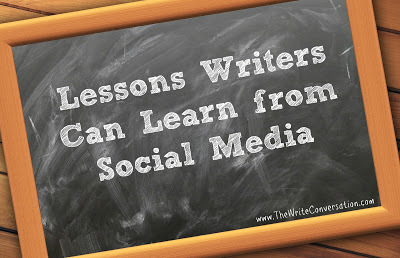 With the right focus, we can learn a lot from the comments our friends post on social media.
With the right focus, we can learn a lot from the comments our friends post on social media.
There was a time when reading about someone being stuck in traffic or the contents of their grocery cart annoyed me. My internal response would be, “Why do I care?” Then it hit me. Okay, God hit me with it. He showed me I was looking at these posts from the wrong point of view.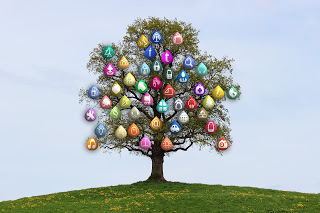 Now don’t get me wrong. My social media friends are people with wants and needs, like all of us. And I don’t just see them as things to be used for obtaining my goals. I truly care about them, even though I don’t personally know most of them. So if I’m unwilling to invest myself in their lives, then I don’t confirm, add, link, or connect with them online.
Now don’t get me wrong. My social media friends are people with wants and needs, like all of us. And I don’t just see them as things to be used for obtaining my goals. I truly care about them, even though I don’t personally know most of them. So if I’m unwilling to invest myself in their lives, then I don’t confirm, add, link, or connect with them online.
I love their posts because they teach me how others think. They also expose me to different cultures because many of my contacts live in other countries all around the world. Their lives are witness to the fact that we’re all God’s unique creations, but alike in many ways.
Does this mean we should use our new found information to manipulate our writing to fit certain personalities? In most cases, no. We must remain true to our stories, only using our recently acquired knowledge to reach a specific audience when that is the intended purpose of our words.
I find increased awareness of our similarities and differences is most useful in creating characters with greater depth—characters whose personalities draw our readers into our stories because the readers can relate to them on a more intimate level.
 Maybe you enjoy the sport of people watching. If you’re like me, you find observing others to be the most interesting part of shopping or dining out, or even traveling. Think of social media as a great way to increase this activity. We can use the internet to incorporate all the citizens and cultures of the world into one of our favorite pastimes.
Maybe you enjoy the sport of people watching. If you’re like me, you find observing others to be the most interesting part of shopping or dining out, or even traveling. Think of social media as a great way to increase this activity. We can use the internet to incorporate all the citizens and cultures of the world into one of our favorite pastimes.
The use of Facebook and similar sites is a wonderful way to meet new people and experience new places. And it’s a marvelous vehicle for traveling on a limited budget. But, what I believe most important is that it’s a great way to expand our understanding of human psyches. Then we can apply this awareness to developing more complete, believable, and lovable characters. Characters our readers will enjoy reading about.
Do you agree? I really want to hear your thoughts. Let’s keep the conversation going.
TWEETABLES
Lessons Writers Can Learn form #SocialMedia – @BDBrady007 on @EdieMelson (Click to Tweet)
Studying #SocialMedia updates can teach authors about their potential audience - @BDBrady007 (Click to Tweet)
 Bruce Brady is an author, writer and playwright. His work has appeared in Focus on the Family’s Thriving Family, www.ChristianDevotions.us, and on stage. Currently, Bruce is working on a Young Adult Novel about a boy who must deal with the death of his dad, being bullied, and helping his mom through her grief. His first five pages took third place in the ACFW South Carolina Chapter’s “First Five Pages” contest.
Bruce Brady is an author, writer and playwright. His work has appeared in Focus on the Family’s Thriving Family, www.ChristianDevotions.us, and on stage. Currently, Bruce is working on a Young Adult Novel about a boy who must deal with the death of his dad, being bullied, and helping his mom through her grief. His first five pages took third place in the ACFW South Carolina Chapter’s “First Five Pages” contest.
When he’s not writing, Bruce spends time learning from and helping other writers. He serves as Mentor of Word Weavers International’s Online Chapter, and as a member of Cross ‘N’ Pens, The Writer’s Plot, ACFW’s National and South Carolina Chapters.
“My dream is to entertain my readers and give them hope as they travel the rocky road of life.”
 With the right focus, we can learn a lot from the comments our friends post on social media.
With the right focus, we can learn a lot from the comments our friends post on social media.There was a time when reading about someone being stuck in traffic or the contents of their grocery cart annoyed me. My internal response would be, “Why do I care?” Then it hit me. Okay, God hit me with it. He showed me I was looking at these posts from the wrong point of view.
 Now don’t get me wrong. My social media friends are people with wants and needs, like all of us. And I don’t just see them as things to be used for obtaining my goals. I truly care about them, even though I don’t personally know most of them. So if I’m unwilling to invest myself in their lives, then I don’t confirm, add, link, or connect with them online.
Now don’t get me wrong. My social media friends are people with wants and needs, like all of us. And I don’t just see them as things to be used for obtaining my goals. I truly care about them, even though I don’t personally know most of them. So if I’m unwilling to invest myself in their lives, then I don’t confirm, add, link, or connect with them online.I love their posts because they teach me how others think. They also expose me to different cultures because many of my contacts live in other countries all around the world. Their lives are witness to the fact that we’re all God’s unique creations, but alike in many ways.
Does this mean we should use our new found information to manipulate our writing to fit certain personalities? In most cases, no. We must remain true to our stories, only using our recently acquired knowledge to reach a specific audience when that is the intended purpose of our words.
I find increased awareness of our similarities and differences is most useful in creating characters with greater depth—characters whose personalities draw our readers into our stories because the readers can relate to them on a more intimate level.
 Maybe you enjoy the sport of people watching. If you’re like me, you find observing others to be the most interesting part of shopping or dining out, or even traveling. Think of social media as a great way to increase this activity. We can use the internet to incorporate all the citizens and cultures of the world into one of our favorite pastimes.
Maybe you enjoy the sport of people watching. If you’re like me, you find observing others to be the most interesting part of shopping or dining out, or even traveling. Think of social media as a great way to increase this activity. We can use the internet to incorporate all the citizens and cultures of the world into one of our favorite pastimes.The use of Facebook and similar sites is a wonderful way to meet new people and experience new places. And it’s a marvelous vehicle for traveling on a limited budget. But, what I believe most important is that it’s a great way to expand our understanding of human psyches. Then we can apply this awareness to developing more complete, believable, and lovable characters. Characters our readers will enjoy reading about.
Do you agree? I really want to hear your thoughts. Let’s keep the conversation going.
TWEETABLES
Lessons Writers Can Learn form #SocialMedia – @BDBrady007 on @EdieMelson (Click to Tweet)
Studying #SocialMedia updates can teach authors about their potential audience - @BDBrady007 (Click to Tweet)
 Bruce Brady is an author, writer and playwright. His work has appeared in Focus on the Family’s Thriving Family, www.ChristianDevotions.us, and on stage. Currently, Bruce is working on a Young Adult Novel about a boy who must deal with the death of his dad, being bullied, and helping his mom through her grief. His first five pages took third place in the ACFW South Carolina Chapter’s “First Five Pages” contest.
Bruce Brady is an author, writer and playwright. His work has appeared in Focus on the Family’s Thriving Family, www.ChristianDevotions.us, and on stage. Currently, Bruce is working on a Young Adult Novel about a boy who must deal with the death of his dad, being bullied, and helping his mom through her grief. His first five pages took third place in the ACFW South Carolina Chapter’s “First Five Pages” contest.When he’s not writing, Bruce spends time learning from and helping other writers. He serves as Mentor of Word Weavers International’s Online Chapter, and as a member of Cross ‘N’ Pens, The Writer’s Plot, ACFW’s National and South Carolina Chapters.
“My dream is to entertain my readers and give them hope as they travel the rocky road of life.”
Published on November 06, 2015 01:00
November 5, 2015
Strengthen Your Writing Muscles with NaNoWriMo
by Lynn Blackburn @LynnHBlackburn
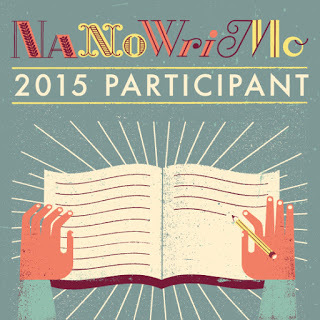 I’m doing
NaNoWriMo
this year.
I’m doing
NaNoWriMo
this year.
There are a million reasons not to, but I’m doing it anyway.
Are you familiar with NaNoWriMo? NaNo, as it’s often abbreviated, stands for National Novel Writing Month. The goal is to write a new, 50,000 word novel in thirty days.
That’s 1,667 words every day for thirty days.
I’ve done it before. I’ve “won” NaNo twice. (I’ve written about it here and here).
But that was years ago. This year? Well, it’s not really a good year.Here are a few of my reasons for NOT doing NaNo. Maybe you can relate?It’s November. No one should attempt anything crazy in November or December. Thanksgiving is just a few weeks away and we will be hosting my husband’s side of the family for the big day. Not only that, but there are only eight Fridays until Christmas (go ahead and start hyperventilation now).I homeschool. This is new for our family and we are still figuring out how to do this thing. We don’t get to take the month of November off so Mommy can write. I’m doing a
Whole30
. I am slap in the middle of a thirty day nutritional reset. That means no sugar. No chocolate. No lattes. It means a lot of cooking, a lot of meal preparation, and not having the option to say, “I’ve been writing, let’s order a pizza,” at least for the first half of the month. This is a bad time to commit to a writing challenge.I haven’t even started yet! Before I can begin a new project, I have to finish my WIP and as I type these words, I’m still 3-5K away from typing “The End.”
I’m doing a
Whole30
. I am slap in the middle of a thirty day nutritional reset. That means no sugar. No chocolate. No lattes. It means a lot of cooking, a lot of meal preparation, and not having the option to say, “I’ve been writing, let’s order a pizza,” at least for the first half of the month. This is a bad time to commit to a writing challenge.I haven’t even started yet! Before I can begin a new project, I have to finish my WIP and as I type these words, I’m still 3-5K away from typing “The End.”
So, to review. I’m busy. It’s a hectic time of year. I have already made commitments to my family and my health that require a lot of time and mental energy, and it’s challenging enough to do it in thirty days, but I’ll be trying to cram it in to twenty-five.
At this point, some of you are considering an intervention. You’re already warming up to comment with things like, “Um, sweetie, you know this might be a good year to consider skipping NaNo.” Or maybe, “You’re being too hard on yourself. You need to build in some margin and not pile so much on your plate.” Maybe some of you will be little more blunt and you’re ready to go with, “You’ve lost your ever-loving mind.”
I hear you. But I’m doing it anyway.
Not only that, but even though it’s already November 5th and you may not have been planning to do it, I think YOU should consider giving it a go.
Here’s why.
 At my CrossFit box, we occasionally do these super short, super intense workouts. A few weeks ago our Coach explained that when we push ourselves to the limit during these short workouts, what we are really doing is building up our endurance and strength for the longer workouts.
At my CrossFit box, we occasionally do these super short, super intense workouts. A few weeks ago our Coach explained that when we push ourselves to the limit during these short workouts, what we are really doing is building up our endurance and strength for the longer workouts.
No one can or should push themselves that hard all the time. But short, intense workouts? They help you get faster in your normal workouts.
You see where I’m going with this, don’t you?
Writing challenges like NaNoWriMo help you build your creative muscles. You push yourself hard for 30 days, and when you get back to your “normal” life? That 10K a month or 1K a day you’d like to maintain feels like nothing. You sit down to write and hit that session goal so fast you haven’t even had time to break a sweat.
Writing challenges also mimic the real life of real authors. Would you care to guess why I didn’t participate in NaNo last year? My copyedits for Covert Justice were due…wait for it…the Monday before Thanksgiving. My final edits were due two weeks after that, smack dab in the middle of the holidays. That’s right. In the real publishing world, editorial calendars don’t make many, if any, concessions for holidays, or your family vacation, or your new diet. If you want to be a published author, you’re going to have to learn to write/revise/market your books no matter what else is going on in your life. NaNo is just a tiny taste of that.
Lastly, writing challenges make the hard work fun. Writing, by its very nature, is often a solitary endeavor, but when you participate in a world-wide challenge, you aren’t going it alone. There are over 300,000 writers participating this year. That might be encouraging at 11PM when you are still 1,600 words away from your goal for the day. It’s really not too late. Start today. You can go official and sign up on the website, or devise your own challenge. Maybe it’s a word count (1K/day - no excuses) or a timed goal (30 minutes a day - no excuses). Make it challenging and don’t quit.
You have nothing to lose except a bit of writing flab. What you’ll gain in creative muscle will pay off for years to come. Even if you don’t hit your target, you’ll be a stronger writer when it’s over than you are right now!
So how about it? Are you doing NaNo this year? Share your NaNo name so we can be buddies! (I’m LynnHB). Are you making up your own goal? Let’s talk about it in the comments. The best kinds of challenges are the ones you’ve made public!
Don’t forget to join the conversation!
TWEETABLESStrengthen Your #Writing Muscles with #NaNoWriMo - via @LynnHBlackburn on @EdieMelson (Click to Tweet)
#NaNoWriMo is a great way to jump start your #writing goals - @LynnHBlackburn (Click to Tweet)
 Lynn Huggins Blackburn believes in the power of stories, especially those that remind us that true love exists, a gift from the Truest Love.
Lynn Huggins Blackburn believes in the power of stories, especially those that remind us that true love exists, a gift from the Truest Love.
She’s passionate about CrossFit, coffee, and chocolate (don’t make her choose) and experimenting with recipes that feed both body and soul.
She lives in South Carolina with her true love, Brian, and their three children. You can follow her real life happily ever after at http://www.lynnhugginsblackburn.com.
 I’m doing
NaNoWriMo
this year.
I’m doing
NaNoWriMo
this year.There are a million reasons not to, but I’m doing it anyway.
Are you familiar with NaNoWriMo? NaNo, as it’s often abbreviated, stands for National Novel Writing Month. The goal is to write a new, 50,000 word novel in thirty days.
That’s 1,667 words every day for thirty days.
I’ve done it before. I’ve “won” NaNo twice. (I’ve written about it here and here).
But that was years ago. This year? Well, it’s not really a good year.Here are a few of my reasons for NOT doing NaNo. Maybe you can relate?It’s November. No one should attempt anything crazy in November or December. Thanksgiving is just a few weeks away and we will be hosting my husband’s side of the family for the big day. Not only that, but there are only eight Fridays until Christmas (go ahead and start hyperventilation now).I homeschool. This is new for our family and we are still figuring out how to do this thing. We don’t get to take the month of November off so Mommy can write.
 I’m doing a
Whole30
. I am slap in the middle of a thirty day nutritional reset. That means no sugar. No chocolate. No lattes. It means a lot of cooking, a lot of meal preparation, and not having the option to say, “I’ve been writing, let’s order a pizza,” at least for the first half of the month. This is a bad time to commit to a writing challenge.I haven’t even started yet! Before I can begin a new project, I have to finish my WIP and as I type these words, I’m still 3-5K away from typing “The End.”
I’m doing a
Whole30
. I am slap in the middle of a thirty day nutritional reset. That means no sugar. No chocolate. No lattes. It means a lot of cooking, a lot of meal preparation, and not having the option to say, “I’ve been writing, let’s order a pizza,” at least for the first half of the month. This is a bad time to commit to a writing challenge.I haven’t even started yet! Before I can begin a new project, I have to finish my WIP and as I type these words, I’m still 3-5K away from typing “The End.”So, to review. I’m busy. It’s a hectic time of year. I have already made commitments to my family and my health that require a lot of time and mental energy, and it’s challenging enough to do it in thirty days, but I’ll be trying to cram it in to twenty-five.
At this point, some of you are considering an intervention. You’re already warming up to comment with things like, “Um, sweetie, you know this might be a good year to consider skipping NaNo.” Or maybe, “You’re being too hard on yourself. You need to build in some margin and not pile so much on your plate.” Maybe some of you will be little more blunt and you’re ready to go with, “You’ve lost your ever-loving mind.”
I hear you. But I’m doing it anyway.
Not only that, but even though it’s already November 5th and you may not have been planning to do it, I think YOU should consider giving it a go.
Here’s why.
 At my CrossFit box, we occasionally do these super short, super intense workouts. A few weeks ago our Coach explained that when we push ourselves to the limit during these short workouts, what we are really doing is building up our endurance and strength for the longer workouts.
At my CrossFit box, we occasionally do these super short, super intense workouts. A few weeks ago our Coach explained that when we push ourselves to the limit during these short workouts, what we are really doing is building up our endurance and strength for the longer workouts. No one can or should push themselves that hard all the time. But short, intense workouts? They help you get faster in your normal workouts.
You see where I’m going with this, don’t you?
Writing challenges like NaNoWriMo help you build your creative muscles. You push yourself hard for 30 days, and when you get back to your “normal” life? That 10K a month or 1K a day you’d like to maintain feels like nothing. You sit down to write and hit that session goal so fast you haven’t even had time to break a sweat.
Writing challenges also mimic the real life of real authors. Would you care to guess why I didn’t participate in NaNo last year? My copyedits for Covert Justice were due…wait for it…the Monday before Thanksgiving. My final edits were due two weeks after that, smack dab in the middle of the holidays. That’s right. In the real publishing world, editorial calendars don’t make many, if any, concessions for holidays, or your family vacation, or your new diet. If you want to be a published author, you’re going to have to learn to write/revise/market your books no matter what else is going on in your life. NaNo is just a tiny taste of that.
Lastly, writing challenges make the hard work fun. Writing, by its very nature, is often a solitary endeavor, but when you participate in a world-wide challenge, you aren’t going it alone. There are over 300,000 writers participating this year. That might be encouraging at 11PM when you are still 1,600 words away from your goal for the day. It’s really not too late. Start today. You can go official and sign up on the website, or devise your own challenge. Maybe it’s a word count (1K/day - no excuses) or a timed goal (30 minutes a day - no excuses). Make it challenging and don’t quit.
You have nothing to lose except a bit of writing flab. What you’ll gain in creative muscle will pay off for years to come. Even if you don’t hit your target, you’ll be a stronger writer when it’s over than you are right now!
So how about it? Are you doing NaNo this year? Share your NaNo name so we can be buddies! (I’m LynnHB). Are you making up your own goal? Let’s talk about it in the comments. The best kinds of challenges are the ones you’ve made public!
Don’t forget to join the conversation!
TWEETABLESStrengthen Your #Writing Muscles with #NaNoWriMo - via @LynnHBlackburn on @EdieMelson (Click to Tweet)
#NaNoWriMo is a great way to jump start your #writing goals - @LynnHBlackburn (Click to Tweet)
 Lynn Huggins Blackburn believes in the power of stories, especially those that remind us that true love exists, a gift from the Truest Love.
Lynn Huggins Blackburn believes in the power of stories, especially those that remind us that true love exists, a gift from the Truest Love. She’s passionate about CrossFit, coffee, and chocolate (don’t make her choose) and experimenting with recipes that feed both body and soul.
She lives in South Carolina with her true love, Brian, and their three children. You can follow her real life happily ever after at http://www.lynnhugginsblackburn.com.
Published on November 05, 2015 01:00



